#history and art history helped me develop my analytical skills
Text
What I've Learned About Teaching Art
I've had the privilege of teaching art in a variety of environments - from still life oil painting at the college level, to combining art with science and history in a museum setting, to guiding highschool students through creating a comics anthology. Through these very different settings, I've found a list of constants that, when I keep them in mind, help me deliver the most enjoyable and effective art education for my students.
One of my core beliefs is that art is, at the heart of it all, something a student must teach themself, and that a classroom, workshop, or camp that wants to teach art is actually responsible for creating an environment and offering projects that facilitate that self-driven learning.
With that on the table, here is the pantheon of truths that, if I can hold on to all of them, help me create that learning environment:
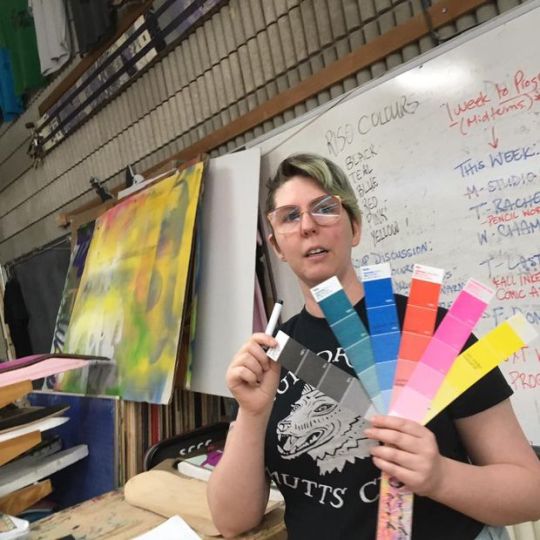
- Almost no one is inherently unable to draw. Additionally, everyone can improve at drawing. With the wealth of "traditional" media, digital tools, and thousands upon thousands of years of art history with which we can map the possibility space, it seems obvious that if someone wants to make art, then they absolutely can. If they want to draw, then no teacher should ever, EVER tell a student that they "can't." The teacher's role is usually to take a student who already secretly believes they can't draw and help them see both the breadth of possibilities and the potential within themselves to improve whatever skills they start with.
- Drawing is not always about making a beautiful image. The obsession with one kind of "good drawing" creates an artificial limit on who is allowed to draw. Sometimes being an art teacher is about expanding a student's definition of art as opposed to pushing their frustrated and dejected pencil along a path towards a narrow goal. The reality is that even within pop culture we see so many gorgeous kinds of art! Beyond that, aiming superficially as an artist for a particular surface result will almost always create lesser work than creating an understand of underlying processes and theories that helped the "good art" come into existence.
- Drawing can teach new ways of seeing. Observing with the intent of drawing can transform how a person perceives the world. So much of teaching art is teaching visual literacy, the literal act of reading meaning within visual input, whether that's a still image, a film, a building or a natural landscape. When you motivate students to read visuals by providing them with new ways to understand creating visuals, you jump start their investment in visual literacy.
- Drawing can help us think about things differently. Thinking can shift along with modes of seeing - what is a structural way of thought? What is a compositional way of thought? When you teach art, you must teach a student to look at things holistically and in granular elements - besides just enhancing thought processes moving between the two states, you can get much more discovery in the analytical and planning modes of appreciating and creating artwork.
- Drawing from reference is as educational as reading. Learning to examine visual reference closely creates a new kind of literacy - visual literacy. Drawing from reference, especially with guided or motivated questions to be answered, can create an opportunity for modes of analysis that students don't get to otherwise use. Developing visual observation and creating a practice of looking both closely and holistically can create a layered understanding of the subject. Even students resistant to traditional still life drawing processes can find benefit in using drawing to answer self-guided questions.
- Learning by making art is a valid mode of learning. Making art can be a mode of learning that both alternates between input and output and creates a sense of ownership/agency in both modes. The hands on creative process is a kind of guess and check system that can be designed carefully to allow students to make a wide variety of types of decisions, and teaches them to create goals and investigate what processes will best allow them to achieve said goals.
- Competition with each other or with some imagined ideal will deflate artistic potential. An art classroom cannot have winners and losers based on "quality" of final piece. Art education will benefit more students if it is process oriented. Quality, even in straightforward skills based art education, can still be subjective, and unless it's an aggressive battle Royale for some exclusive prize, the intent of any art programming is not to find the single best but to encourage each student to improve. So don't be a dick about it.
- Art is a product of restraints. Material, process, time, subject or conceptual restraints allow for a kind of focused play. Giving students free reign is in itself a huge challenge of self direction, goal setting and prioritization. Making some of those choices for them gives them a chance to focus their own learning.
- Materials change the kind of engagement. Diverse materials allow for diverse engagement. Just as subject matter can affect a student's personal investment in a project, the material or method of art making can change their engagement. Changing between drawing and painting, reductive or additive sculpting, stenciling or stamping, will not only change the tactile experience of art making but will affect the modes of thought used to make creative choices.
- Venue or audience transform art. Pressure to show, and to whom, can change students self imposed limitations. Defining an audience will change and add pressure to art creation. This can help students hold themselves to a higher standard, but can also frighten or overwhelm them. Audience needs can be a useful limit or influence on the direction of an art project, but audience pressure needs to be modulated to the response of each student.
- Art is most interesting when it leaves the comfort zone of its creator. This can only happen in a classroom where students feel safe to take risks. Art, even when the subject matter is utterly anonymous or benign, can be a hugely risky-feeling process. Even the act of making art in a classroom environment can feel frightening; if we want students to fully engage, and to take the artistic risks that allow them to learn, we have to spend class time making the classroom into a safe space for the students. This probably needs to be it's own post so I'll leave it there for now and come back and expand upon it in detail in future.
- Subject engagement transforms art. Students with something to say about their subject may push themselves farther. Caring about the subject can be a blessing or a curse for a student - deep subject investment can drive problem solving around how best to present it in the artwork, while deep subject investment can also overwhelm a student with self imposed pressure and even a large dose of imposter syndrome. Therefore it can always be useful to intersperse self selected subject matter with "boring" or at least not emotionally significant subjects, to relieve some of the pressure and allow students to instead respond to the process alone.
- Ownership of a process will empower students. Whether they've designed a process, built their own materials or set their own goals, agency gives students investment. One of the most exciting things about art is that students have a lot of potential control and thus ownership - they will always be making choices, and those choices are potentially exciting because they directly affect the outcome. You can increase this sense of ownership or investment in the class by facilitating student-made materials, like sketchbooks or mark-making tools; or by facilitating student-led exercises or challenges or projects.
- Demos will guide what others make and must be done carefully. Demoing can empower and at the same time overwhelm or impose limits on the viewers. Demoing must be designed to specific goals of each assignment. Eg: if you want students to use surgical techniques to explore value, or depth, or composition, whole you absolutely have to demo the technique didactically, you need to be careful not to be didactic about the results you want in relationship to the subject of exploration. Showing a wide range of potential approaches can help in classrooms where students can handle large info dumps, but often it's better to demo the technique, get them trying it out without further instruction, and then redirect then to the topic of exploration as stage 2.
- Material potential can power a room. Art supplies can be motivating all on their own. Getting excited about them can make it safe for the students to get excited as well. There are many different supplies available to teach art with, and trying different ones can add a lot of excitement to the room even if your topic of instruction is narrow. Getting excited about materials can change the mood of a classroom entirely.
- Criticism must engage with the student's goals or it will work against you. Setting goals, and then reflecting on them, is key to art education as so much of art is self directed. If you then ignore that setup and approach critique without listening to your students' internal direction and goals and at minimum acknowledging them, they will not find your critique constructive. This goes for young children all the way to adults - you need to be in dialogue with them.
- Open discussion and open ended questions will always help. Once you've found a way to make the classroom a safe space, group discussion powered by open ended questions can open everyone's mind up to broader possibilities. One on one conversation also benefits hugely from open ended questions and encouraging students to reflect and investigate their own process and practice.
- Letting students share their learning is important to help the class grow beyond your own limited experiences. Students will often still feel in competition with each other, so instituting non-competitive collaboration and sharing will be important to minimizing classroom tension. This can be demonstrated first with art games and developed into collaborative processes on more serious projects.
- You can never clarify the instructions enough. Always repeat yourself, be prepared to repeat demos, have a written list of instructions and delegate helpers. Breaking projects up into stages can help with detailed instructions, but always show an overview first. Art is overwhelming and there is no process so simple everyone is automatically good at it. Accurate following of a process will often help students who are unsure of themselves prove themselves to be competent and your job as the teacher is to make sure they have everything they need to do that.
- Techniques are best remembered when students use them to solve specific problems. Show how applicable to different problems a technique is during demos. Be prepared to reteach or to teach new techniques whenever students hit a wall. Encourage them to reflect over the techniques they have at hand to see if there's a new way to use one that could solve their problem.
- Art is mostly learned by doing. Material literacy is gained only through material exploration. If you spend too much time talking/demoing before they get to try the materials the enthusiasm can fade. If you have a student who is frightened of doing it wrong, the most important thing is to make a safe space for them to do it wrong, because that's the only way to eventually do it right.
These are all best case scenario tips - and while I've tested them all to know they work, it's still hard work to keep everything in play in every classroom. I'm hopeful that having this written list will help me, and maybe by sharing I can help others as well.
Art is a privilege to teach, but I believe it is incredibly important for everyone to get to learn it, in a safe environment where the effects of an art practice can be the most beneficial.
Are you teaching a creative subject? What are some techniques or core values you bring to your classroom?
Read the full article
116 notes
·
View notes
Note
I am an ENTJ and often feel alienated among my friends in terms of understanding culture - movies, art, books, etc. Mine are mostly N-domes, ENTPs, ENFPs, INTJs, but also ENFJs. At the same time, when someone articulates to me the deep meaning of a movie I like it, it would be great to have such deep understanding. Is this due to the N high in the stack in my friends? What can I do to improve my understanding?
The higher and more developed the N function, the more people rely on abstract data and information, the more likely they are to make abstract connections, and the more willing they are to entertain abstract meanings and a variety of possible interpretations. However, this natural Intuitive leaning does not automatically guarantee that one would be good at interpreting the deeper meaning of stories - cognitive processing and cognitive skill are separate issues.
To have a deeper understanding of fiction, one also requires some knowledge, skill, and expertise in applying methods of literary analysis and critique. It is often said that, subjectively, people can take whatever they want from art, which is true. However, some interpretations are objectively better than others, and not everyone possesses the background knowledge and analytical skills to understand that. This is why art history or literature majors look at creative works very differently than the average person.
With regard to being ENTJ (inferior Fi), I should mention that one's subjective experience of art is an important stepping stone to discovering its deeper meaning. Specifically, art is often meant to evoke certain memories, experiences, feelings, and emotions that help each member of the audience connect to a larger theme or universal truth. If you aren't very in touch with yourself and don't reflect very much on your identity, you'll find it difficult to connect with art on a deeper level. Also, cultural references/issues don't hit very hard when you're not aware of and/or don't care much about your part within the larger culture.
Thus, for ENTJs, this issue relates to both Ni and Fi development. Lack of development in either or both functions can present obstacles. Consult the Type Dev Guide about how to develop them.
#intuition#intuitives#abstract#meaning#interpretation#fiction#art#identity#entj#auxiliary ni#inferior fi#ask
18 notes
·
View notes
Text
Week 12: Artistic Vision Statement
compulsory question two
Upon revisiting my artistic vision statement, I have identified additional strengths beyond illustration. I recently rediscovered my passion for Illustrator, finding that I can still produce high-quality work. Additionally, I enjoy photography as a creative outlet during my free time. While I believe my illustration skills could benefit from further exploration of diverse mediums.

(01) "Effective time management is crucial for graphic designers. It is necessary to track time to meet deadlines and produce quality work. Additionally, understanding time helps maintain a healthy work-life balance."
While dedicating time to schoolwork is crucial, I have come to realise, through the feedback I have received, that prioritising personal time is equally important. Balancing the demands of school and work has been a source of significant stress and fatigue.
Among the design companies that have captured my attention, Practice Theory stands out. Their work exemplifies the creativity and innovation that I aspire to emulate in my own design endeavours.

reference (02)
While scrolling through their Instagram page, I came across something that captured my attention. I feel that the exploration of various mediums and experimentation has been broadened through my engagement with Studio and Image Materiality. Lately, I have discovered a newfound interest in delving into the extensive realm of branding; there's something about it that intrigues me.
Positioning the tagline 'Singapore’s Premier Visual Arts Precinct' at the forefront of all communications allowed them to underscore Gillman Barracks as the leading destination for contemporary visual arts in Singapore, contributing to the enhancement of its cultural position.
I loved the seamless integration of the image within the grid lends an air of effortless flow to the design, ensuring cross-platform adaptability and consistency in visual identity. The ingenious 'GB frame' grid system effectively anchors and highlights the list of standalone events, creating a clear and concise design system for the audience. The rebranding introduces a refreshing typographic approach and a new typeface while also retaining the existing brand colours for effective recollection.
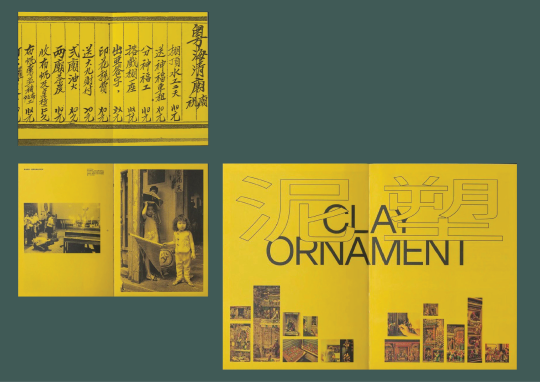
reference (03)
Tradition / Lineage
Another piece from Practice Theory that piqued my interest. I have developed a recent interest in experimenting with typography and abstraction. It marks a departure from my usual comfort zone, as I explore ways to add intrigue to my designs and push the boundaries of my creativity.
A book that documents both the conservation process and the craftsmanship involved in The Yueh Hai Ching Temple.
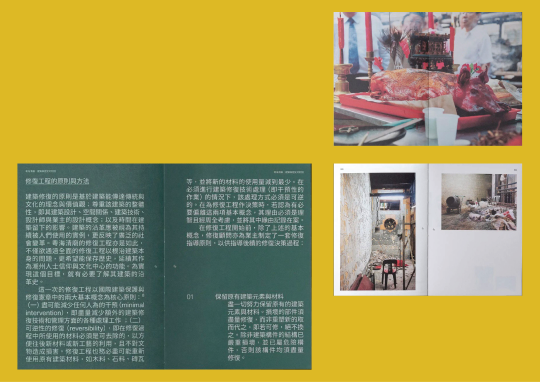
The book's layouts were crafted to merge architecture and history in a contemporary yet traditional fashion, incorporating traditional Chinese characters and imagery.
(05) "Using 3 colours that are closely tied to Teochew architecture (green, ‘Pig’s Blood’ red, and gold), the cover design references lanterns hung above the doors of the Yueh Hai Ching Temple. These lanterns represent the identity of ‘the house’ in Chinese culture. Inspired by their bold and dynamic calligraphy, we designed the name ‘粵海清廟’ (Yueh Hai Ching Temple) in a similar manner, representing ‘the temple’ through strong and graphic type instead of imagery."
(485 words)
(01) Time Analytics "Effective Time Management Tips and Strategies for Graphic Designers" 12 May. 2023, https://timeanalyticssoftware.com/time-management-tips-and-strategies-for-graphic-designers/ accessed 15 Nov. 2023.
(02) Practice Theory. Login • instagram.
https://www.instagram.com/practice.theory/ Accessed 10 Nov. 2023.
(03+04+05) Practice Theory. Login • instagram.
https://www.instagram.com/practice.theory/ Accessed 15 Nov. 2023.
0 notes
Note
thank you so much for calling out fellow white shippers for their racism. as a southeast asian, it’s the bare minimum, yet so many white bnf blogs have stayed quiet. there’s this fear, by some white fans, of speaking over bipoc voices which definitely happens. however, if white fans are for being in solidarity with bipoc, you must call out the behavior of fellow white shippers that bipoc have deemed problematic and yes, it includes your friends. no one is going to cancel you, we just want you to improve your behavior so other shippers feel safer. i also observe that some white shippers are hiding behind only a few poc that they will only agree with, not acknowledging the valid points that the other argument has made. they also will block blogs run by bipoc bc they rightfully criticized their behavior. i also don’t want ppl to think this is just fandom drama bc this is really a discussion about racism, from the white shippers’ treatment towards shippers of color to the way zuko and katara are portrayed in fanfiction. if you feel personally attacked, i’m asking that you take the time off from online to reevaluate yourself and ask what behaviors am i perpetuating that makes fellow shippers uncomfortable? why do i feel attacked? thank you again for your call out post bc so many poc like me have been disappointed by the silence of so many white bnfs.
TW racism
I appreciate you thanking me. I did it because it was the right thing to do. I wasn’t going to say anything at first because, again, I didn’t feel like I could add anything to this conversation about fandom racism, but then I saw someone (I’m on mobile, I can’t look up the post, sorry) saying they were leaving the Zutara fandom because of a slur used by (presumably) that anon and they were rightfully calling out White people for staying too quiet about this. So I knew I had to make that post.
I’m so sorry people (you or others, I’m not quite sure) have been silenced on this issue. People have every right to talk about the racism they’ve suffered from. And yet they’ve gone unheard by people who didn’t want to grow. I know it doesn’t mean much, but I’m sorry. The thing about conversations is that there’s many sides. Many opinions, many points of views. Unless it’s, idk, right-wing rhetoric for example, you should listen to all sides of a conversation. It’s only fair, especially about an issue as complex as racism.
I know this may feel like a tangent, but I studied History and Art History. One thing I learned is that there will always be something new to discover. Yes, many events or time periods are very well documented, but we’ll never understand them 100%. We’ll always find something new that will change our way of looking at things. New allegories on a painting, new languages on ancient scrolls, or new writings on the walls of temples. These all give us more insight into a given time period. Archaeologists consciously leave dig sites before they’re done because they know in the future, new technology will manage to dig deeper, to find better, and to cause even less damage in the process. The future is always full of possibilities - even about the past!
All of that said, what you learn in History is to keep an open mind. You learn to shut up and listen to multiple points of views. You learn to try and understand the multitudes of people who lived millenniae ago. And it’s a valuable skill you can apply to your every day life.
That’s what I’m trying to do.
(Btw. What does “White bnf blogs” mean? I’m unfamiliar with that term)
#zutara#zutara fandom#zk fandom#zutara fandom salt#zk fandom salt#again if i went out of line about anything in this post please tell me#history and art history helped me develop my analytical skills#highly recommend!#plus who doesnt want to look at 500 BC statues or baroque paintings
9 notes
·
View notes
Text
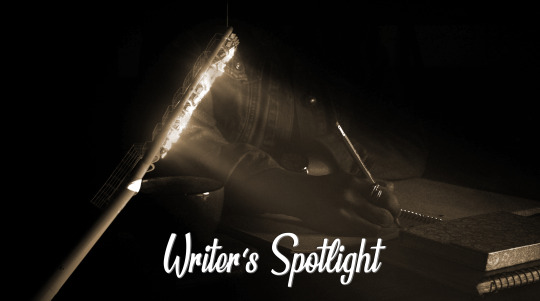
Today’s interviewee is the lovely Emma ( @livinginsunnyhell / ProstheticLoVe), author of hits like Never Tear Us Apart, Homecoming and The Evolution of Kissing. While she might still be considered somewhat new to the fandom, having been here for a bit over a year, she has already largely contributed to it and I’m sure will continue to do so in the future!
GT: What can you tell us about yourself?
E: I am an American female who wishes she lived in Europe. I recently transitioned from working in marketing to data analytics. I love traveling, reading, exercising, knitting, coding, and writing. I’m also in the process of moving across the country for the second time. I’ve been writing fanfiction off and on for about 15 years which is nuts to think about. Actually more like almost 20 years but I didn’t publish anything until I was 14. I love writing, it’s my greatest passion, but since I’ve transitioned more into a STEM field it’s exciting to find other things I’m good at too. I definitely have a growth mindset when it comes to my hobbies and in my life in general.
GT: Wow, sounds like you have multiple skills! That's incredible! How do you choose what you want to do when you have some free time?
E: Lol thanks. Yeah that’s a great question cause I honestly have no idea. I wish I had more free time. I’m in the middle of knitting a dog sweater for a friend and I haven’t had as much time as I want to work on it. It was a lot easier when I wasn’t working.
What works for me is having a set goal of what I want to do everyday for writing, exercising, and coding. I got into a really good habit of doing all three of those things after I lost my job and it all kinda stuck. I’ve also virtually stopped watching TV except for new Shameless episodes. I just haven’t had the time. Since I have such little free time right now I’ve been focusing on what I really want to do which is make my writing better, get better at coding, and exercise for my sanity. So it’s really a juggling game and utilizing what little time I have for things I want to work on.
GT: I'm so jealous of your focus. I just graduated in webdesign and I should DEFINITELY practice coding and learn more, but I just feel so tired! Same with writing, I spent a long time not writing anything, trying to get back to it now… And don't even get me started on exercising… Seriously jealous.
E: I know exactly what you mean. I should preface this with saying it took me a very very very long time to get to where I am with writing every day and exercising. I went years without writing especially when I was working in marketing because of writing content for websites everyday and I was burnt out, so I definitely get it. For me, covid weirdly centered me and helped me figure out what I wanted my life to look like going forward. Losing my job really was humbling and a blessing in disguise cause it helped me kinda get back to where I wanted to be. Obviously it’s difficult and I was lucky but it’s not something you do overnight it’s taken years to get this mentality.
So don’t be jealous! That’s awesome that you graduated in web design! It’s a very fun and growing field. I have friends who really love their jobs.
GT: Tell me a bit about your history with fanfiction. You said you started writing it really young. What fandom did you write for?
E: So initially I was obsessed with Buffy the Vampire Slayer. I have notebooks upon notebooks full of Buffy fanfiction that I never published (and that’s deeply terrible). But after Buffy my first fandom I posted in was That 70s show. Then there was Veronica Mars, Lost, Sons of Anarchy, The OC, Gilmore Girls, One Tree Hill, Once Upon A Time, Arrow, X-men, and Degrassi (over several years and flowing obsessions). They were all generally never finished.
As I got older, I started to write better and focus more on the art and process of writing. I also developed better grammar and storytelling. I’ve gotten many, many, reviews saying very critical things that in the end helped me be a better writer.
After a while of not writing, I came back to fanfiction for The Vampire Diaries fandom and Veronica Mars when the movie was released. And I think that’s when my writing went from cobbled together fics that were rarely finished to an actual story I was proud of.
What’s really interesting is seeing the upward trajectory of my writing. I wouldn’t recommend anyone reading those early fics (I’d even argue no one read my very first few gallavich fics from last year) but it’s fascinating to see how I went from tiny very terrible stories to ones that were much more in depth and well rounded. The last fandom I was in before gallavich was a super tiny one called Veep and prior to that I hadn’t written in years.
GT: What made you want to get into the Gallavich fandom?
E: I had seen Shameless when it first came on Netflix many years ago. My mom actually watched the show since the beginning and loved it and kept telling me to watch it. Finally I got around to doing it and really enjoyed it until I found out Mickey wasn’t on the show passed s5 so I stopped watching at s5. (Most of my ships never got a happy ending so I didn’t want to watch another ship crash and burn.) Then right before season 10 came out I think I was on Tumblr and saw someone post about Mickey returning so I went and did some research. Once I found out it was true, I decided to rewatch and rediscovered gallavich. And as always when I develop an obsession with a tv show/movie/book, I turned to fanfiction. It’s funny cause I was in a very small fandom so coming into Gallavich was almost overwhelming because it’s so big and there’s so much to read.
GT: Tell me about it! It's impossible to catch up, not that I'm complaining. Which of the fics you've read did you enjoy the most?
E: I know right!! It’s incredible! So the first multi chapter fic I read that really solidified my love of gallavich was The Road To Ruin by bricileur10. I was blown away by that fic. Holy shit. I also loved The Sun, Chasing The Moon by devovitsuasartes. I really liked the method of storytelling and where they took the story post canon. And the other one I read in the beginning and loved was When the Party’s Over verse series by emryses [@merlinoutofcontext]. As you can see I’m very into canon compliant. I also really enjoyed the Our Souls series by @wehangout and Drop Your Guard by allysavedtheday (also I highly recommend Seal my Fate). Now, I’ve also really enjoyed Like Real People Do and Everything About You by grayola [@gallavichy]. And anything by Coldreign, gallavichsecurity, AnnaNSmith [@annansmith], sadwhales, and @captainjowl. I’m trying to get away from only reading one shots but right now that seems like the only thing I have time for.
GT: And what was the motivation for your first Gallavich fic?
E: That’s a great question. So my motivation in general for fanfiction is if I’m dissatisfied with something that happens in canon, I feel unfulfilled, so I need something to help wrap up the story. The reason I write in general is two fold: 1) I can’t find a story I want to read that has the specifics I’m looking for and 2) I can’t get an idea out of my head.
I hadn’t written for about a year I think when I wrote my first gallavich fanfic. (Like I said I had a lot of WIPs that were abandoned and I didn’t want to do that to another fic.) So I started off slow with a fix it fic, which turned out okay. It’s called Fifty-Five Fires and it was set right before 10x10. Then a multi chapter evolutionary fic about their kisses which I loved writing because it expands over 1-10 and I really wanted to write something that explored their history together. I got the idea for The Evolution of Kissing because I saw a showtime compilation of their history and it triggered the idea of exploring their kisses. I was hesitant to write the fic but the idea wouldn’t leave me alone so I did and promised myself I’d finish everything I started and I have.
GT: Has the fandom reception to your fics surprised you?
E: Yes! It does surprise me. It’s funny when I look at my writing I think it’s okay. It’s better than where it was but I still struggle with a lot. It’s such a process. When I read over my older fics and when I say older I mean in the last year, I see the weak areas I should’ve written better rather than what’s actually really good. There are areas I definitely want to work on like I’m too introspective and I need more action. I’m hoping with my upcoming fics I can change that.
GT: When did you start watching Shameless and what attracted you to Ian and Mickey's relationship?
E: I started watching Shameless when it came out on Netflix a few years ago and then came back right before season 10. I’d seen it off and on through the years but until it was on Netflix, I hadn’t seen more than a few episodes here and there thanks to my mom who watched it religiously. I remember her telling me about Mickey and Ian’s relationship and now when we watch it together, she always awws when something happens with them. One of the first episodes I saw was when Ian left Mickey at the border and I remember being intrigued by it.
Initially what attracted me was the bad boy liking the ‘good’ guy. But then I got to know the characters (and understand them more) and I really liked Mickey’s internal struggle toward accepting himself and then his fierce love for Ian. I also loved how Mickey took care of Ian when he was diagnosed with bipolar. I really enjoyed Mickey’s transformation and I loved how sure Ian was of Mickey. Initially, I was really drawn to Mickey but now I’d say I enjoy watching Ian just as much. I have a newfound appreciation for Ian, especially when I rewatch. Mickey’s so much more in your face with everything and Ian is so much more subtle and I really enjoy that juxtaposition. The biggest attraction to their relationship is the history, their deep love for each other, and their friendship. Their relationship is also so layered and there’s so much to explore as a writer and an audience member but you know these characters love each other deeply. You can feel it.
GT: Do you have a preference for writing one of them?
E: I go back and forth cause I want to show both of their POVs. In my multi chapter fics, I switch off. I find writing Mickey easier but I relate more to Ian. Ian I find to be very difficult to write especially as an adult. In the beginning of s11, I found it difficult to write Mickey too. I always worry I write them too soft. But I like writing them equally.
GT: What's the most difficult thing about writing them?
E: Oh that’s a hard question. I’d say 1) keeping them in character. I really strive to keep them in character no matter what and sometimes it’s easier to do than others. I’ve nixed huge scenes and entire ideas cause they sounded off to me or I know I couldn’t keep them in character.
2) the emotional scenes. I’ve written some scenes where they talk to each other and try to work through their shit. This is most evident in Never Tear Us Apart and it’s difficult to balance who they are with what they would say and do in an emotional situation. There are some things I want then to say but I know they’d never say it. So specifically in Never Tear Us Apart Ian and Mickey both open up to each other about different things and they are long speeches but I wasn’t sure how to write what their character would say without it coming off as unrealistic and preachy and off putting. So it’s really that balancing act between believable and being true to their character. I found this particularly difficult with Mickey in the beginning of writing gallavich and then after s11 started. I worry I write him as too soft (and sometimes too smart, even though I think he’s smart) vs. keeping him in character.
GT: It really is a trick balance.
E: It really is!
GT: What's the best thing about writing them?
E: The best thing about writing them is that there’s so much to explore. I love writing canon compliant fics (although I do have an AU coming out for the Big Bang and I’ve started outlining another AU) with them because there’s just so much there. They have an incredible amount of history to choose from and explore and I feel like every time I watch a new scene I discover something else about their relationship I want to write about. You can write teenage gallavich or explore Ian just being diagnosed with bipolar and Mickey finally coming out. Then there’s post s5 and all the things you could imagine after that. There’s Mexico or prison. Finally established gallavich which is my preferred writing niche is a lot of fun to write. My favorite part about writing them is how they take care of each other. I like reading and writing Mickey taking care of Ian when he’s having a low episode and I like Mickey working through his internalized homophobia with Ian’s help. What’s so great about writing gallavich is their history and the foundation of their friendship. They genuinely like being together and that’s the basis for all the fics I write about them. They genuinely just like each other.
GT: Do you do any research before or while writing?
E: Yes lol. I have a whole process. Either I’ll rewatch a few scenes or in the case of Chocolate and Cigarettes I rewatched the entire first season. Generally I’ll bookmark a part to look into later so I don’t lose the writing flow. Usually I research while editing or to get into ‘the mood to write’ I’ll rewatch some scenes.
GT: How much of your fics are outlined and how much is written "on the fly"?
E: All of my fics are outlined. From the multi chapter to the one shots. Outlining helps me so much. I mentioned before that I have a lot of abandoned fics in other fandoms and that’s because I wrote on the fly with no idea where the fic was going. I slowly got into outlining in the last fandom I was in but it wasn’t as intensive as it is now. When I wrote The Evolution Of Kissing, I wrote my first in depth outline and I contribute that to how quickly I finished that fic. Now I outline everything and it’s also a way to help me figure out if I genuinely want to write the fic. If I finish the outline and I’m lackluster about it, then I won’t write it. However I don’t always stick to the outline. Sometimes the fic has a mind of its own. But usually outlining helps me finish the fic, know where I left off, add in little hints to wrap everything together, and check off the scenes and themes I want to incorporate.
GT: How often do you post when you write multi-chapters? Do you write chapters in advance or do you post them as you write them?
E: So generally I post once a week. Usually on Wednesdays or Friday/Saturday. I got into a really good habit of posting once a week. (I used to post sporadically. The gallavich fandom is the only fandom I’ve written on a schedule.) The outlining really helps to guide the story for me. I’ve never written chapters in advanced except for the Big Bang fic I’m working on. That’ll be my first story I’ve written all in advanced and posted at once.
I prefer to write as I post them because sometimes people will leave comments that make me think about adding in other scenes or going in a slightly different direction.
GT: Yes, I totally get that, feedback is important. Speaking of, what are your favorite kinds of comments to receive?
E: It is! And it’s fun to see what people think of the story and what will happen. Lol any comment really, whether someone wants to leave an emoji or a long comment, I’ll take either. It’s just nice to know people are enjoying the story. I do like hearing where people think the story is going or what their favorite parts are. I recently had a lovely reviewer leave an amazingly heartfelt comment that was really impactful. I also love to see people who have read a few of my stories return and leave their thoughts. Honestly I just like engaging with the readers and hearing what they think of gallavich and the storyline I decided to explore.
What I like about aO3 though is the ability to give kudos. I like that you’re able to see if people are enjoying the fic even if they don’t feel comfortable enough to leave a review.
GT: I wish we could leave kudos in every chapter.
E: Yes! I agree. I wish that was a feature too.
GT: What kind of fics do you write the most?
E: Mostly I write canon compliant. I have written a lot of one-shots lately that are bunched together in different series but I like writing multi-chapter fics more. Recently, I’ve had a lot of one-shot ideas. Most of my fics are established but I also like writing pining and getting together. I’m tentatively stepping into the AU world with my Big Bang fic and the next multi chapter fic I write, which I’m planning to be 20 chapters.
Lately, most of my fics are fluffy, but I also have smutty and a little angsty. It’s hard since most of the oneshots I’ve written recently have been very soft and transcending through their history. But for my next fic, I want to move away from that and write more angsty and lots of pining. This is a long way of saying I like writing different things so you’ll find a little of everything.
GT: What about reading, what kinds of fic do you usually read?
E: Oh wow I have so many open tabs right now. Lately I’ve been reading established and s11 fics. I have really enjoyed watching the new episodes and then reading new fics that help to fill in the gaps. I love established gallavich and reading where writers are taking them. I love the little cute domestic moments in fanfic that really bring gallavich to life.
Overall, I love reading canon compliant but I have enjoyed reading AUs with chef Mickey, best friends, enemies to lovers, soulmate, and meet cute fics. I also enjoy reading fics that explore their issues too such as Ian’s bipolar and Mickeys internalized homophobia.
GT: What makes you close the tab and give up when you're reading a fic?
E: Generally my computer crashes lol. Or I finally get around to reading the fic. I also have a spreadsheet of fics that I sometimes put everything into to help keep track of everything. Honestly I’ll close a tab and five more will pop up of fics I want to read or saw recommended. I think right now I have 80 tabs waiting to be read.
GT: Lol no, I meant, what makes you stop reading?
E: Oh lol! Duh. Sorry. I’ve been reading a lot of one shots cause I can’t get away with reading a one am fic right now so that’s helpful to stop reading organically.
Also, I’m picky about what I read. I dislike reading OOC, pet names that wouldn’t happen in canon (like baby and sweetie), saying I love you too quickly, slow burns that aren’t actually slow burns, large grammar mistakes (everyone makes them but when they are happening consecutively it can take me out of the moment.), actions that take me out of the moment or words that a character wouldn’t say, and lots of telling vs showing. If I like the summary, I’ll definitely check it out. This is across all fandoms for me. I really value when someone can write a character in character and show they understand them so fics that miss that mark I can’t get into as much unfortunately. Oh! Also character bashing. And I mean any character.
GT: To be fair, Ian did call Mickey "baby" canonically now lol
E: That’s true and I have to come to terms with that. I also took it as more of a yeah baby type deal! But it’s all up for interpretation. I do like coming up with nicknames Mickey would use for Ian so there’s that.
GT: Which other characters from the show do you like? Do you ever read or write about them?
E: I love Fiona and Carl and Lip. I don’t write anything other than Ian and Mickey but I have my own head canon about Mandy and Carl. I also really like to write family scenes and Ian and Mickey with the rest of the Gallaghers. I guess I like writing Mickey and Ian interacting with other characters (except Frank and Terry) but I wouldn’t write a whole fic about another character on the show.
GT: Wait, tell me more about that headcanon about Mandy and Carl.
E: I’ll probably get a lot of hate for this and it’s not a popular opinion but I think Carl would be great for Mandy. He is the sweetest. I think (minus his White Boy Carl phase) he treats women well and Mandy needs someone who appreciates her. I think her and Carl could be happy together.
Lip was always so awful to her and I think Carl would be the badass she liked from lip with the sweetness of Ian. Carl just had to grow up. It’s really weird I know.
GT: It's definitely unusual, but I've seen worse pairings. It's difficult for me to imagine because I still think of Carl as a child, but in reality Mandy is what, 5 years older? But yeah, it's a bit weird for me, though I've definitely seen weirder, so maybe someone will agree with you.
E: Yeah I know what you mean. I still see Carl as a little kid too. And this is so a futuristic head canon. It wouldn’t happen for like 10 years when it’s one of those things where they run into each other at gallavich’s first kid’s birthday party. They just happen to be eating together and Mandy still sees him as a little kid but they become friendly and hang out at these whenever they’re put together. And a few years after that they slowly become friends after Mandy moves back to a Chicago and Carl randomly runs into her. Over time, Mandy stops seeing Carl as a kid and Carl admits he used to have a crush on her and they one day decide to start dating after they’ve both been stung too many times by other people. So it’s all very much in the future. Like I said it’s kinda weird and I don’t actively ship it. It’s just a nice way for two characters who have been dealt a bad hand in love to get a happy ending.
GT: What's your favorite Gallavich fic that you’ve written so far and why?
E: They’re all my favorites cause they’re my kids lol. But I’d have to say that I’m more proud of some of the fics I’ve written than others.
I really enjoyed writing Never Tear Us Apart and the oneshots that came after that. I loved writing established gallavich and having them start to work on some issues. It was a lot of fun to write the holiday oneshots and dive into their first year of married life.
The fic I’m most proud of though is the Chocolate and Cigarettes series. It’s two five chapter fics, one takes place from Mickey’s POV and the other from Ian’s and it’s from before canon to 1x09. Cigarettes is about Mickey learning to come to terms with being gay and what that means. It’s a deep dive into his sexuality and Chocolate is about Ian learning what love really is. It’s basically how we got from Ian thinking he’s in love with Kash to running to Mickey when Monica comes back. This is the fic I tell people to read when they ask what they should read by me. I really like the themes it explores and how it all comes together. I think it brings to life what could’ve happened behind the scenes in season 1 that we didn’t see.
And after it comes out, my Big Bang fic will be my favorite cause I really love the pining and sexual tension in this fic. There’s a scene that is all sexual tension and it’s description, so it was difficult to write but it came out really really well.
And lastly my favorite one-shot is tied between Sensory Detail and Bathtime For Bondage. The first one deals with clothes sharing for gallavich, which I loved to dive into the history of some of their clothing items and how it ties into their own history. The second one is about them scheduling bath tub dates and I really enjoyed writing Mickey’s growth of enjoying baths and that romantic time with Ian.
GT: Where do you get the inspiration for your fics?
E: Everywhere. It’s really a disease. I get inspired to write all the time. Sometimes I get ideas from moments in the show that I wonder what would’ve happened if something changed or I get inspiration from metas or other fanfics. When I talk to @annansmith, I get a bunch of ideas as well like the bathtub fic. Sometimes I’ll just be running or taking a shower and an idea will hit me that I can’t shake. I have a lot of ideas but not enough time to write them. And also I’ll see prompts on tumblr too. @ianandmickeygallavich just posted a bunch of great prompts that looked fun to write. So really it’s everywhere but it’s what sticks with me that I end up writing.
I have a google doc I dump all my ideas or situations I want to explore into. Sometimes I’ll just write hand holding and I know I want to write a fic or a scene about hand holding. The google doc is about 5 pages and color coded to help me figure out what’s just a fleeting idea and what I genuinely would have fun writing.
GT: Again, I'm very jealous of and amazed by your organization skills.
E: Lol I will gift you my skills. I have a lot of anxiety and planning helps to combat it.
GT: How many fics do you have in the works now? What can we expect from you for the future?
E: So I am working on a little series called The Passing Of Time right now. I have two more parts to finish in that series. It focuses on specific moments in gallavich’s relationship such as friendship, hand holding, romance and shows the development from the beginning to now.
I also have a Big Bang fic that will be coming out that’s an AU. I’m really excited about it. It’s very different than any fic I’ve done before. And it’s an idea I’ve had for a really long time so it’s been great for that to come to fruition.
And then my next project is a multi chapter fic that will also be AU. I would like to write a post s11 fic exploring gallavich’s new life living on the west side. I’d also like to write another fic that continues in The Rest Of Our Lives series which dives into season 11 with fix its and filler scenes. But I only work on one fic at a time so there’s a lot of things I want to write and it’ll take awhile to get around to it. So yes you can expect a lot more from me in the future.
GT: Awesome!
E: Lol thanks! I’m looking forward to it.
GT: Back to Shameless, if you could change one thing that happened to Ian and Mickey on the show, what would it be?
E: Hm... that’s a great question. You know I’m not happy with all of the decisions that have been made or the directions they chose to go in. I had an issue with the start of s11 for instance, but I am happy with where they have ended up. As someone who wasn’t sure after watching 11x1 I have been really happy with the season and I think the finale will be really good. Obviously it would’ve been great if Mickey stayed through the series but I’m not sure if we would’ve gotten the same ending that was as satisfying. I think we would’ve gotten way more drama for drama’s sake rather than letting the storyline go organically. Obviously we’ll never know what would’ve happened post s5 if Mickey stayed, but I would love to know what they had planned. So it’s probably an unpopular opinion but I am happy with the trajectory of the show. There were a lot of trials and tribulations but I’ve never shipped a couple who got that happy ending, who got married, and who we got to see grow. And if we had to go through all of that just to get a really great ending for them, then I think it’s been worth it.
That being said I do have issues with certain aspects of the show. I mean I wouldn’t write so much fanfiction if I was completely satisfied with it. There are areas I wish we would’ve gotten to see more of and themes that I think should’ve been further explored and interesting to see in their story.
GT: Such as?
E: I would’ve liked to see more about how they fell in love back in season 1 and the summer of love in season 2. What was going on in season 2? There’s not much there. We know they hook up but Ian overall doesn’t have a huge storyline in s2. And how do we get from Mickey and Ian just hooking up in season 1 to Ian running to Mickey post Monica’s return? I’ve written my own what I think happens but it would’ve been great to see just a tad more to really understand and see Mickey softening to Ian and Ian learning about Mickey.
In season 4 to 5, it would’ve been interesting to see what happened after Ian wouldn’t get out of bed and how they got to cohabitating with Svetlana. What are Mickey’s feelings there? Especially with Yev. It would’ve been interesting to just get a little more feelings about how Mickey balanced all of it. As for the first low episode, how did they both deal with that? Did Mickey try to talk to him? Did Ian tell him it was just the drugs?
While Mickey was gone, it would’ve also been nice to see Ian miss him more. We’ve gotten some great Mickey missing Ian scenes but it would’ve added to the story (and the heartbreak) if it was reversed. Ian is really depressed in s6 and we can assume why but does he still have Mickey’s stuff around? Does he think about him at all? Does he tell stories about him? Also what happened between s5 and s6 with Mickey’s sentencing? Was Ian there? And Ian visiting Mickey in prison and in juvie. What happened? Did he go often? Did he visit once a week or once a month?
I would’ve also loved to see them more in prison and their life there. What was Mickey thinking? Was Ian more remorseful? How did they come to terms with being back together? Did they have any conversations about the past? Or did they just pretend everything is fine? Prison I think would’ve been the most interesting storyline they pretty much skipped over their time there to get them back to the Gallagher house.
Also later on in their relationship in s10 and s11 I would’ve liked to see how they dealt with Ian’s bipolar. It was such a big thing to tear them apart and yet we don’t see much of it since it doesn’t add to the story so it’s not utilized. I also would have liked to see Mickey talking about Ian leaving him in prison and the border. How did they work through all of that? Or have they? And it would’ve been interesting to hear the follow up and the rationale a little more about the monogamy conversation. How did they end up there? Why are threesomes okay? Will they reevaluate the rules later on? And how does that mash up with Mickey beating someone up when he found out Ian did the porno/was cheating in him? Also the porno? Is that just totally forgotten?
I guess I just wanted to see a bit more into their lives and how they ended up on certain topics and things together. And the themes I’d want more explored are: falling in love, heartbreak, Ian’s bipolar, Mickey’s past, Ian realizing he needed to do better, monogamy, staying in love, parenthood, and dealing with the past.
GT: Basically, we all wanted the Gallavich show. Or at least for Shameless to have better writers lol. I understand the feeling, it's the wasted potential. They could have done much more with them, showed so much more, that we can't help but feel disappointed that we didn't see more. That's the great thing about fanfiction though, we fill in the gaps ourselves, many times over.
E: Yes exactly! It is wasted potential! I actually feel like that too with Fiona's storyline as well. They basically made her storylines all about guys after season 3 and it’s really a shame because I love the family aspect of the show.
GT: What's your favorite season of Shameless? Do you have a favorite episode?
E: Oh shit lol. Hmmmm I really like seasons 1-5. I think they are really well done. I could watch those five seasons again and again. (And I have) without skipping any scenes. But if I have to pick a favorite season... I think I’d say 4 cause that’s where a majority of my favorite episodes lie. However, I’ve also really enjoyed seasons 1 and 11.
Yes I have a favorite episode. I have several. I love 4x11 and 4x12. I also love 10x12 and 5x09. But I’d I have to choose 5x08 because the sorry I’m late scene is my absolute favorite. There are many scenes I’ve watched over and over and have really enjoyed.
GT: That's about all I had to ask! One last thing: how did you come up with your AO3 and Tumblr usernames?
E: Sweet! Well I love Buffy the vampire slayer and one of the characters refers to Sunnydale (the name of the town they live in) as Sunnyhell cause it’s the mouth of hell. And my AO3 name is actually a song by typhoon that played during an important Veronica Mars scene and LoVe is the name of the ship that I enjoyed in Veronica Mars. So it’s a play on the song and on the ship.
I just wanted to say before we finish up that this has been really fun to do and I thank you for the opportunity. I’ve read a lot of the other interviews and I love that you’re doing a wide variety of authors in the fandom. It’s neat to see authors that I’ve read and enjoyed and writers who I’ve never read but now know about and am looking forward to checking out. So thank you so much for doing this and showcasing a wide variety of authors and artists. It’s a great opportunity and I appreciate it as a reader and writer.
GT: Thank YOU for participating, it was a pleasure.
#gallavich#Ian x Mickey#Shameless US#gallavich fanfiction#writer's spotlight#Livinginsunnyhell#Shameless
57 notes
·
View notes
Text
Fukuzawa Yukichi: INFJ [BSD]
Ni > Fe > Ti > Se
*Based off Season 1 of the anime [Chapters 1-12] with character-based spoilers from the Wikis. I’ve also read a synopsis of “The Untold Story of the Founding of the Detective Agency,” which gives lots of insight into Fukuzawa and Ranpo in particular, and also I know Yosano’s backstory. The Onsen Drama will also make an appearance occasionally. I feel like I have a good enough grasp on their characters for this and will only add more examples rather than changing types in the future. (At least, I think so.)
I’VE ALSO SEEN HIM TYPED AS: ISTJ, ISTP, ENFJ
Ni is a tricky function. It also doesn’t help that Fukuzawa is very well-balanced. Many people reference the fact that he values tradition and the past to say that his dominant function is Si. Which isn’t necessarily true. Both INFPs and ESTPs can be kind from the outside, but the real difference is in their motives and reasons for behaving that way. I like history. So I must be an ISFJ. (And there are plenty of ISFJs who hate history.) It’s the reasons for liking / doing something that differentiates type. For all we know, he could like tradition because he connects to many of their intuitive values and ideas (Ni) or the visual aspects such as clothing design (Se). I know that applies to me, for sure. We also aren’t aware if Fukuzawa’s respect of tradition extends past Japanese culture as an overall Si value. It’s also worth mentioning that respecting others’ traditions, beliefs, and culture isn’t applied to just Si. Fe keeps tabs on exactly that; other people’s feelings, values, etc. Now that we’ve combed through why he’s not automatically an Si-dom, I’ll get to why I think he’s Ni dominant. He continuously thinks ahead. Si also does this, but not to the extent that Ni does. In ‘The Untold Story,’ we see Fukuzawa’s attention focused on the future in more than one instance. He planned about ways to ditch Ranpo and created the Agency to fight for justice even after their deaths. That’s relatively big-picture thinking to me. The difference between Si-dom Ne-inferior and Ni-dom Se-inferior is this: ISxJs need to learn to accept different was of doing / looking at things while INxJs work to bring their vision and ideas into the concrete world. Fukuzawa seems to fall into the second category. (I also think it’s quite obvious that he’s not Fe dominant.) I’m also trying out this theory that generally someone’s likes and dislikes correspond to whether or not they’re a sensor or intuitive.
LIKES: Cats, beef hot pot, alcohol, equality
DISLIKES: Feudalism
Surprisingly quite equal between sensing and intuition. (Or not so surprising, as he’s balanced.) However, I don’t buy Fukuzawa having a large gap between his Thinking and Feeling functions. So, by default, it must be between Sensing and Intuition. It’s also worth noting that his only dislike is intuitive in nature.
When Atsushi was kidnapped, Fukuzawa needed to ask the world’s greatest detective for help. Ranpo mentions not being interested in a promotion or bonus (likely due to past experience with Te-using bosses), but Fukuzawa offers praise (something his Fe knows that Ranpo loves). Which works. Te would behave in the same way that Kunikida responds (duh). We all know that Kunikida is very moralistic -- but he was also the one to suggest Kyōka be handed over to the authorities. In this case, both Te and Ti would be on the same page, which we see with Ranpo and Kunikida. However, Fukuzawa disagrees. While an IxTJ’s Fi could definitely place value on its members, it would likely see the potential threat of Te reputation tarnishing (like Kunikida did) and still side on letting one member that he wasn’t very connected with go, for the sake of the ADA. Ranpo states to “Consider the reasoning behind it.” Fukuzawa answers with “One of our own is in danger. He needs help. Are you telling me that there can be any better reasoning than that?” A Thinker wouldn’t say that. Though developed ones may place more value on Feeling, they’d fundamentally disagree with that statement. Tertiary Te has an Fe blind spot that, however developed, they won’t necessarily care much about. They may realize its potential, but won’t be worried about using it. And that doesn’t seem to apply to Fukuzawa, in my opinion. It seems like clear tertiary Ti filtering through auxiliary Fe, which is also the exact same judging axis and positioning as Atsushi and Tanizaki (ISFJs).
Again, Ti often filters through Fe with Fukuzawa, but paired with Ni, can create an illusion of Te. However, he doesn’t use logic in the same way that people like Kunikida do. His Ti can often keep up with Ranpo -- at least, significantly more than other people can (other than maybe Dazai). But that does make sense; an xNFx and an xSTx would understand an xNTx pretty well, but not completely. I previously did consider ISTP, but dominant Thinking doesn’t seem right. Even with somewhat developed Fe, IxTPs will still primarilly use Ti in decision-making. They won’t turn into Feelers. And I really just can’t imagine Fukuzawa with inferiro Fe, even if he is well-balanced.
Naomi went to get Fukuzawa because of his position as the organization’s president, but also because she needed his Se push that she wasn’t able to do. And, as stated with the Ni section, he was able to create the Armed Detective Agency as an outlet for his vision. Fukuzawa is also said to be quite skilled in martial arts. However, this doesn’t necessarily mean he’s a sensor. I mean, I’m an INFJ who took MMA for three years and was pretty decent at it, but all that did was develop my Se more. I’m not a sensor now. And besides, he’s not only had plenty of opportunities but plenty of time to develop his inferior function.
Te Blind Spot: Ti combined with Ni or Fe can often give the illusion of Te. Of course, he definitely has Te skills due to development, but much of the legwork for this function rests on Kunikida.
Ni-Ti Loop: ‘An INFJ in an Ni-Ti loop attempts to suppress their emotional side, shutting themselves off from others and becoming unable to share their feelings with those around them. They will become extremely withdrawn and private, attempting to become analytical and logical without employing their feeling side. They will attempt to view everything in a logical light while shutting off their tendency to consider things in the light of the feelings and values of those around them. In addition, they will repress their feelings.’ source Just head on over to Fukuzawa and Ranpo’s Dynamic.

#bungo stray dogs#character analysis#typology#bsd fukuzawa#infj personality#infj#fukuzawa yukichi#mbti types#mbti personality types
13 notes
·
View notes
Text
Ask Me Anything: Finding Your Art Style
I get this species of art question so often that I now think it’s worth making a blog post to answer it (for posterity). The question usually goes something like this:
“How did you find your style of art?”
Which is a valid question. Unfortunately, this is a question with extremely vague and mundane answers. Note: these answers are very rooted to my particular development as an artist, though bits and pieces can be applied generally.
Answer 1:
Just draw.
Yeah there’s really no secret to it – just keep drawing. All that practice will teach you what your eyes and your hands like, and what you like.
Answer 2:
Do a lot of studies – gesture drawings, anatomical studies, style studies, composition, etc. There are plenty of online gesture drawing tools listed on Google.
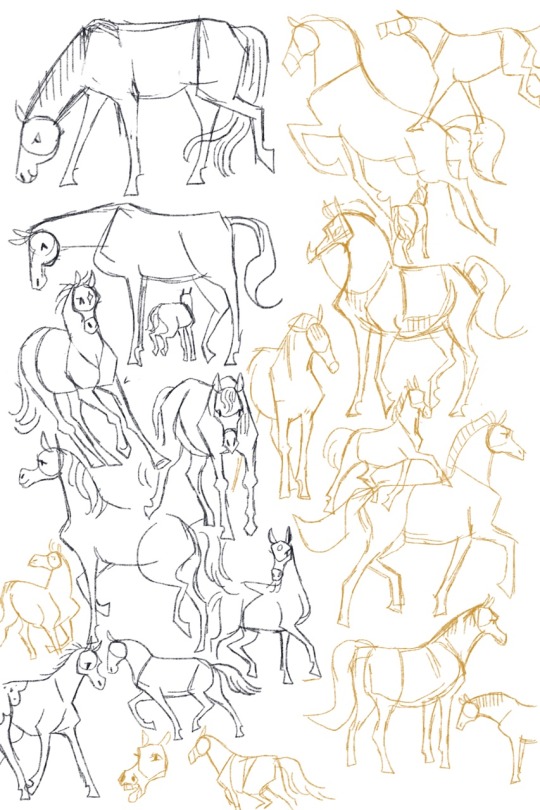
Observe life with your eye.
Experiment with different tools.
Take a closer look at drawings from artists you like and ask questions: why do you like it? What has the artist done to make that work appealing to you? Is it the lighting, the colour palette, the inking style, the way they stylise hands? Identify and pick up those elements and do your own spin on it. (This is different from tracing/copying, because you’re engaging in critical and analytical thought)
Find out your favourite artists’ influences and study those influences’ portfolio the same way as above.
Answer 3:
Consume art from outside your field and medium and genre. Film cinematography, theatre, set design, graphic design, packaging, music, physics, history, architecture, the list goes on.
Answer 4:
Figure out who you are as a person first, then artist. Find what you love and indulge in it, and put that love into everything you draw, no matter how little.
Answer 5: (specific)
I’ve always had my style since I was… 9? I rarely ever had anxiety over “finding a unique style”. What I would worry about, despite my strong artistic voice, was the immaturity of my skills – anatomy was trash, I didn’t know how to draw humans, some elements could be improved… which made sense cos I was a new artist. So between the ages 13 – 17 I really went in hard on Answers 1 to 4. I wrote a monthly journal cataloguing each thing I wanted to worked on, and I did exercises. And it’s helped a lot.
If you can can bother going through my Deviantart from the first art to the most recent one you can see the learning journey.

Growing as an artist takes a lot of time and a lot of effort. Avoid comparing yourself to artists your age group or younger who already have clocked in more hours, and avoid thinking it’s a difference of talent. It’s not. The difference between you and the other person is practice.
Answer 6: (specific)
But what is an artistic voice? I think it’s the essence of yourself – the way you observe and interpret the world – that can’t be helped. It shows as the little quirks that persist – maybe it’s a particular line style or a repeating motif or a colour palette.
For me, for example, I tend to stylise shapes and emphasise clear silhouettes, even when I attempt realism. This may or may not have influenced me into being a highly graphical illustrator. You won’t see me doing highly-rendered conceptual painterly drawings. That’s just not me.
Honestly I’d recommend not worrying about your artistic voice, or trying to force it out. An artistic voice is something that already lives within you. And if you say you can’t see it, that you don’t have it, it may just be an issue of self-confidence, rather than an issue of non-existence. You just haven’t reached the level where you can see it. And how do you get there? Answers 1 to 4.
Focus on expanding your foundational skills, critical thought and inspiration toolbox instead. Doing this will gradually build up your self-confidence. One day you’ll find that you have clearer eyes, and you’ll be able to look back and admire how much you’ve grown.
Answer 7 (specific):
Here is a list of my foundational influences – the ones that inspired me as I was developing my art.
Chris Riddell, Shaun Tan, Emily Carroll, Dave McKean, Joann Sfar, Milt Kahl, Tadahiro Uesugi, Alessandro Barbucci, Tom Oreb.
Nowadays, my influences are all over the place. I don’t think I can point to one specific illustrator that majorly influences me anymore. From the top of my head:
40’s to 60’s stylised book illustration and animation. UPA animated shorts, JP Miller, the Provensen illustrators, Golden Book series, Soviet animation, 101 Dalmations.
Illuminated manuscripts from different cultures and history.
Early 20th century Japanese woodblock illustration and its 21st century descendent. Hamui Kawase, Tatsuro Kiuchi, Tadahiro Uesugi.
Rifle Paper & Co.
Wes Andersen.
Stop motion animation, especially from Laika.
European graphic novels (bande dessinee)
In Conclusion
Thematically, my advice is similar to the one in my Where Do You Get Your Inspiration? post — just chill, pal. Don’t force it. Engage in the world a lot. Do your thing.
This ‘Where do you find your style/inspiration?’ question has been going on since at least 15 year ago, but it definitely feels more urgent in this socmedia era of the internet with a rush to produce art that gets shared and becomes capital (social and financial). There’s a lot of pressure to come out with perfect and consumable art. Like Athena out of Zeus’ head. And it can look like you either need A Style, or have a particular genre of style, to be successful.
As someone who’s been drawing for more than a decade and has gradually become more professional, I can assure you what matters more is that you’ve a good work ethic and you love what you do. Your style, whatever it is, will become more clear as long as you put in the hours and the dedication.
Good luck with your journey.
------
I keep a semi-active blog if you want to read more thoughts from me about craft (like this), my work, life, and all the things that bother me. (https://blog.reimenayee.com)
#art#art style#long post#ask me anything#I am always looking for more questions to answer so hmu#if you want something more long form
94 notes
·
View notes
Text
The Signs as school subjects I associate them with
(This is longer that usual and it's also leaning more towards the Greek Educational System as my knowledge for classes in other countries derives from movies/series)
------------------------------------
♈ Aries: Physical Education
Aries remind me of physical activity, lots of energy and bonding with others through team sports. Sometimes there is a very competitive atmosphere but most of the time it's pretty fun and you get to try out new things and get better at them over time.
✧
♉ Taurus: Home Economics
Basically Home Economics was part of the subjects I preferred because it's not super complicated. You learn a few basic but quite vital things about everyday life and that's what I like most about this subject. I connected this one with Taurus because they have a home-y aura and also because they live in simplicity and most of them have their life together.
✧
♊ Gemini: Latin
So the Greek Educational System kinda removed this subject but I think it's such an interesting subject because it's some sort of combination between History and Foreign Languages. It also has some sort of elegance (in my opinion) which reminded me of Gemini.
✧
♋ Cancer: Art
At first I wasn't very sure about Cancer, but I decided to go with art. Art classes themselves might be a little boring because of the instructions you have to follow, but generally turning your thoughts and emotions into a piece of art is wonderful.
✧
♌ Leo: Drama
Personally I'm not very fond of that class (if you have social anxiety you'll probably know the struggle) but it's a very nice way of expressing yourself and making new friends. I also think that through acting you get in touch with your emotions and it also slowly helps you become more confident. I'm not sure why, I just thought that Leos would be a perfect fit for this subject.
✧
♍ Virgo: Biology
Biology has always been part of my favorite subjects, whether a lesson is confusing or easy. I think it's really cool how some schools even have microscopes to study small organisms and learn how DNA is created. I chose Virgo for this one because of the attention you have to pay to details.
✧
♎ Libra: Literature
Literature is probably my most favorite subject in school (and also the only one I'm really good at). You get to see each writer's technique (which is helpful if you like writing), you get to read extracts from many different books and you get an idea of how different cultures and people can be. Some of these small stories that we read have some kind of elegance, which reminds me of Libra for some reason that I can't explain.
✧
♏ Scorpio: Chemistry
Chemistry is a little difficult (at least in theory sometimes) but it's really fun to learn about the different elements and see what they do through chemical reactions. Also getting to do small experiments is really exciting as you get to get to try and make the mixture change color or form or something (it makes me happy to see chemistry labs and things related to it because we barely do anything like that, maybe like once in 1-2 years??). I associated it with Scorpio because even if your instructor has already said what will happen during a chemical reaction, it's a little bit of a mystery until you get to try it yourself.
✧
♐ Sagittarius: Geography
I haven't had this subject for quite a while now, but I remember struggling a little with some lessons. Though it seems kinda boring, it's actually kinda inspiring. Sure, you may not care about the names of a bunch of rivers or the population of a country, but the culture or some places from a certain country can grab your interest. Geography makes me think of planning a trip, and I feel like a Sagittarius would be a nice companion when traveling around.
✧
♑ Capricorn: Mathematics
Mathematics require A LOT of attention (I've made many stupid mistakes because of not paying enough attention), concentration and long logical thought process, which is probably why I'm not very good at it. Even so, I do think it's quite an intriguing subject and it's pretty important to a certain degree. Capricorns remind me of Math because of their organization and analytical skills.
✧
♒ Aquarius: Philosophy
Now this is a subject I really like but have a hard time understanding. It's challenging because of the way you have to express your thoughts, but at the same time it's kinda fascinating to see the development of thought process and theories about humanity and the world throughout the millenia. Aquarius remind me of Philosophy in the way that you might not always understand their thoughts but you also can't help but be impressed by them.
✧
♓ Pisces: Music
So music is another pleasant form of self expression and it also keeps you calm (unless you have very noisy classmates who won't cooperate). I haven't had music classes since middle school but it was really fun to participate in the choir and try out a bunch of different songs. I've always associated Pisces with arts because most of the ones I know are very talented and they love music.
#astrology#zodiac#aries#taurus#gemini#cancer#leo#virgo#libra#scorpio#sagittarius#capricorn#aquarius#pisces#yeah idk#for fun ig#noni's life
168 notes
·
View notes
Text
Hey witches! It’s been a while, I am back with this post for all you beginners out there! Hope you like this
DIVINATION 101
WHICH WAY IS RIGHT FOR YOU?
Divination is one of the most-practiced branches of magick. Even non-magickal folks will sometimes flip a coin to make a decision, or crack open a fortune cookie with more than idle curiosity. As a student of the magickal arts, it's likely that you dabbled in divination as one of your first forays into the Mysteries. Skillful divination puts you in touch with both your inner knowing and external wisdom that will help you along your path.
But many beginners ask the question, Where do I start? How do I navigate the maze of stones and bones and cards and tea leaves and other options confronting me? In this article, I'll discuss five common methods of divination: Pendulums, scrying, Runes, Tarot, and freestyle reading. I'll then put on my Professor Trelawney glasses and peer into your soul to recommend the best method for you. Each recommendation is based on your skills and proclivities--and just for fun, your star sign.
Keep in mind that no single method is necessarily better than another. (Also remember, it's okay to practice more than one method!) I don't buy into the myth that says that a reader who uses Tarot cards is somehow less talented than a reader who doesn't. The goal is to find the best expression for your natural psychic gifts. Starting with the right tool(s) will accelerate learning and cut down on frustration.
Pendulum Dowsing
A pendulum is basically a weighted string that is held in one hand. The user (or dowser) observes the subtle movements of the pendulum to gain information about a question, object, or environment. Put another way, dowsing uses your physical body to express phenomena that are detected by the psychic senses. (For an easy introduction to pendulums, see this article.)
One of the advantages of pendulum dowsing is that it requires very little investment of time or money to get started. There's nothing to memorize. You don't need a book, chart, or specialized equipment. You can dowse with a necklace, a fishing bob, even a teabag! What you do need is unwavering concentration and a good dose of body-based intuition.
Swing into dowsing if you:
Favor a simple, "yes or no" answer to your questions
Can usually trust your gut feelings
Excel at grounding and centering your personal energy
Want a tool that's compact and convenient
Identify as a kinetic learner/thinker (more than verbal or visual)
Pendulum powerhouses: Virgo, Cancer, Aquarius, Taurus
Runes
The Runes are both an archaic Norse alphabet and a set of powerful magickal symbols. The 24 letters of the Elder Futhark are the most common form of runic divination. They are inscribed on tiles of bone, stone, or wood and shuffled by the Rune reader. They are traditionally a masculine tool associated with the deity Odin. Each Rune has at least three meanings: A phonetic sound, a literal meaning, and a figurative or abstract meaning. From narrowest to broadest interpretation, the Rune called Berkana could stand for the letter "B", the Birch tree, birth, creativity, or the feminine principle.
Despite this apparent complexity, the Runes are famous for giving it straight. They have their own personality, and are never hesitant to point out folly or disaster. Modern readers often try to moderate the voice of the Runes by employing multi-tile, Tarot-style readings. But the purest way to consult the Runes is by drawing just one Rune stone--a "take it or leave it" proposition that doesn't leave any room for waffling.
One more thing: The Runes are a special treasure of Odin--legend has it that He hung on the World Tree for nine days and nights to receive the secret alphabet. The Runes reward devoted study and shy away from dilettantes. To truly unlock their secrets, be prepared to make some sacrifice reminiscent of (though not necessarily equal to) the God's own.
Take up the Runes if you:
Don't mind receiving answers that are harsh or blunt
Are willing to study or meditate on the symbols to receive their wisdom
Rune-meisters: Scorpio, Aries, Capricorn, Sagittarius
Scrying
Scrying encompasses such time-honored practices as gazing into crystals, water, or fire. Along with dream interpretation, it is one of the oldest forms of divination. The term comes from the archaic word "descry," meaning "to make out dimly."
The scryer goes into a relaxed, meditative state and gazes into a bright or reflective object. (A popular choice is a bowl filled with water or a crystal ball illuminated by candlelight.) The resulting information is usually in the form of imagery, but some scryers may also hear sounds or feel sensations during a session. With any luck, the scryer's visions will shed some light on the question or situation at hand.
Successful scrying does require a certain amount of natural ability. Some beginners gaze for long hours and experience only frustration. But anyone who is able to have visions will find their skills developing with practice. Focus improves, images intensify, and interpreting the visions becomes easier for the practiced scryer.
Try scrying if you:
Are a visual thinker (artist, designer, daydreamer)
Have experienced psychic dreams or spontaneous visions
Are drawn to sparkly or reflective objects
Enjoy trance and meditative states
Have knowledge of dream lore and symbols
Super scryers: Pisces, Gemini, Scorpio, Cancer
Tarot
It's no secret that I judge the Tarot to be (probably) the finest divination method ever created. It bridges the gap between intuition and knowledge. As a consummate narrative tool, Tarot dovetails with our human tendency to tell stories about ourselves. A few random cards can illustrate the past, present, and future of any drama, along with its stars and its supporting cast.
Still, Tarot's not for everyone. It's a complex method (or can be) and often throws hippie-dippy, purely-intuitive types a curveball with its 78 cards and nearly infinite permutations.
Here's a secret: Invest as much or as little study time as you want. Unstudied beginners can still get satisfactory-to-great results by responding to the imagery on the cards. People with a head for facts and correspondences are great at teasing out additional meaning from a spread. But readers who can integrate both their left- and right-brain functions are predisposed to become Tarot adepts.
Tend toward Tarot if you:
Are drawn to art, literature, history and mythology
Have a good memory and make connections easily
Are a natural storyteller
Welcome complex or ambiguous answers
Are both creative and analytical, and able to balance these traits
Tarot superstars: Gemini, Sagittarius, Libra, Virgo
Nothing at All
Some readers don't use any tools at all. Instead, they rely on some combination of gut instincts, energetic perception. They listen carefully for psychic signals from their body and
inner voice. Empty-handed readings can be done for yourself or others.
The potential pitfalls are obvious: If you come up blank, there's no real starting place for the reading. (Struggling readers often resort to cold reading tactics or self-help cliches rather than real information.) Then there's the problem of bias: Without external tools guiding you, you're more likely to let your personal opinions and preconceptions color the reading. Good communication skills are essential to this type of reading. Many talented readers fall flat because they can't articulate what they're seeing or feeling.
Kick it freestyle if you:
Are very sensitive to energy (and good at putting your feelings into words)
Can easily put aside your biases during a session.
Find divination tools distracting
Are a natural healer who holds others' best interests at heart
Have the confidence to deliver a reading without tools for backup
adapted from Grove and Grotto
Unencumbered wonders: Aquarius, Aries, Pisces, Taurus
#male witch#christian witch#witchcraft#magick#witches#magic#hedge witch#green witch#christian witchcraft
19 notes
·
View notes
Note
Hey there! Could you share some experience on studying classics? I am currently deciding if it’s a good way to go, since I don’t know what a typical job could look like. But my love to Latin and Ancient Greek tells me not to worry about it.
Hi!
I think concern over job prospects is a standard worry for anyone considering pursuing an arts or humanities subject, as it doesn’t lead to a clear job path (I felt the same myself when I first started thinking about studying classics in uni!) But it’s important to remember that unless you are studying something clearly vocational (like nursing, law, medicine etc), no degree is going to prepare you for a specific job - you won’t be any more or less employable with a classics degree than you will be with a science degree, for example. Personally, I’m hoping to continue in academia, but other career paths I’ve looked into are teaching, publishing, museums, and libraries, to give you some ideas. I know people who’ve gone on to work in law, HR, social media & IT companies. For things like law and teaching, you’d obviously need to undergo further education (often a one year postgrad course) or training. If you want both classics and some specialized training for a specific career, you could look into taking classics alongside another subject - you might do a joint major in classics and library science, for example, or classics and journalism, or classics and museum studies (specific subject combinations will depend on your university).
My experience with classics has been overwhelmingly positive, and I certainly don’t regret choosing it over a more vocational degree. Classics is an excellent choice because it’s such an interdisciplinary subject - it gives you a bit of everything: literature, drama, philosophy, history, politics, languages, art, architecture, archaeology, gender & sexuality. It has links with a wide range of other subjects and disciplines, which means you’ll develop a broad skill-set. In particular, you’ll develop great critical thinking, analytical, and communication skills - which are transformative for your life as a whole, not just your employability (your education is about more than just your career)! If you already know you love Ancient Greek and Latin, then I would encourage you to go ahead and study it. In school, my career guidance teacher told us we should study what we love, because if we love it we will find a way to make it work. You’ll be much happier and more fulfilled if you are pursuing something you love.
I hope there was something helpful in all that. I answered a question similar to this here
#classics#asks#why study classics#jobs with classics#job prospects#classics job prospects#careers with classics#careers
9 notes
·
View notes
Text
‘The Absent Father and Spider-Man’s Unfulfilled Potential’: Rebuttal Part 1: Introduction
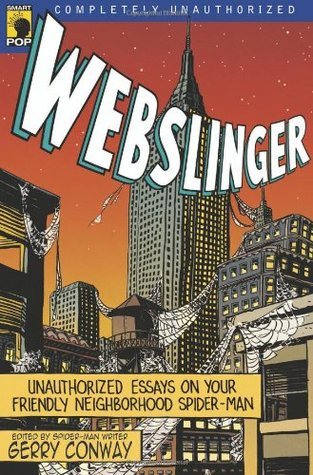
Master Post
Back in 2012 I read a very interesting book called ‘Webslinger: Unauthorized Essays on your Friendly Neighborhood Spider-Man’.
As the title suggests it was an anthology book made up of several different essays about Spidey (and edited by Gerry Conway himself).
The essays are an interesting read, though there are questionable points made and some inaccuracies.
Today though I’d like to debunk some points made in the essay titled ‘The Absent Father and Spider-Man’s Unfulfilled Potential’.
The reason for my desire to debunk parts of this essay is partially due to my inherent instinct to debunk problematic or misinformed stuff surrounding Spider-Man generally. However it’s also partially due to the author, J.R. Fettinger.
Fettinger is the creator and author of the essays found on ‘Spideykicksbutt.com’ and a regular panellist on the Spider-Man Crawlspace podcast. I respect both and the content they provide though there have been times I’ve disagreed with both and other times where quite frankly I think they’ve put forward statements that are outright wrong.
Fettinger and his work was the inspiration to an extent for me even choosing to write so much about Spider-Man, helped bring me back into fandom and his work helped me reconcile some things that I had felt made me an uninformed minority within fandom.
However, there have been times, more and more as the years move forward, wherein my eyes have narrowed at Fettinger’s statements regarding Spider-Man.
He once said something to the effect of ‘alcoholics are just stupid people doing stupid things through no fault but their own’.
He has repeatedly attested that it is morally wrong for Spider-Man and Batman to not simply murder characters like Joker or Carnage.
He has said that Otto’s actions towards Peter in Superior Spider-Man render him the worst enemy Peter has. This is in spite of him being a huge Norman Osborn fan.
He has essentially stated criminal killers like Shriek or Vermin (who suffer from severe mental disorders) deserve no sympathy.
He has said Kraven’s Last Hunt was flawed (to put it more delicately than he did) because Peter ‘never settled his score’ with Kraven.
He has even said that whenever DeMatteis gets into the psychological aspects of the characters he ‘goes off the deep-end’.
These views are most especially chronicled in his on-going segment of the podcast ‘Spider-History’ wherein he takes a month’s worth of (usually 616 Peter Parker) Spider-Man comics from a bygone month decades ago, recaps them and analyses the stories.
However, what is so frustrating to me about these segments as time has gone by is that Fettinger is overly critical and incredibly cynical. He has put forward his opinions as fact with little analysis or consideration of an alternative point of view.
To be blunt with relatively few exceptions he surmises each month in this section as mediocre-bad unless it contained something by Marv Wolfman or Roger Stern, two of his personal favourite runs.
Even then he puts across reductive summaries of the events of the book, in particular phrasing things to make certain characters (like Spider-Man himself) come across as worse than they actually are in the stories in question.
This is particularly a problem in my view because Fettinger’s status as a long read, knowledgeable and analytical fan confers onto him a certain degree of authority in regards to his statements about Spider-Man.
And you know what? It should.
He really does know A LOT about Spider-Man and he has made some incredible assessments about stories and characters related to the wall-crawler.
I cannot recommend you check out his website Spideykicksbutt enough.
But here is the thing...I do not advocate blind trust in his word, or anyone’s for that matter. Not even my own. I know A LOT about Spider-Man but I’m far from infallible.
Think for yourselves, do your own research, present your own arguments and counterpoints.
It’s what I do and why Fettinger frustrates me. Because he’s so belligerent to changing his views, most of which are adamantly cynical and judgemental.
Some people I’ve spoken to about this attribute this to his age. Most of his writing and podcast work has been produced when he was in his 40s or 50s.
It is often said that everyone becomes more cynical, grumpier and more stuck in their ways as they age.
I disagree with that in so far as not everyone becomes like that. And 40-60 is not a point when you are ‘done’ becoming who you are going to be and beyond changing.
It is the prerogative of old men to speak their minds but the WISE men are not adverse to changing them.
This is the root of my problems with Fettinger and his cynicism. Not to mention, I find cynicism simply lazy and foolish under most circumstances. Much as I find Fettinger’s ‘kill all criminals’ mentality to crime to be lazy and foolish.
These thoughts struck me when I re-read his essay from Webslinger. I read the essay upon first discovering his work but I apparently have changed in 6 years as I find much of it ill-considered, cynical, judgemental and problem riddled.
Hence my desire now to debunk it.
The gist of the essay is Fettinger talking about how Spider-Man has lots of unfulfilled potential and attributing this to the loss of his father figure Uncle Ben. He goes on to list off different father figures Peter has had and what the end result of their roles in his life might have been. For context this was written around the time of Civil War 2006.
My first and probably biggest bone of contention lies in how Fettinger frames Peter’s ‘unfulfilled potential’.
It’s here where you start to see his overly cynical and judgemental side.
I will not quote him word for word here because it’d take too long. But early on he writes that Spider-Man’s powers come at the price of his happiness, peace of mind and the normalcy that we all take for granted.
This is partially true but still misinformed.
Peter’s mind is most definitely not peaceful most of the time and his life not normal. But there is that key phrase ‘most of the time’. Not all of the time.
Even during his career Peter has had several moments of grace. Most of the stories transpiring in the immediate aftermath of Mary Jane’s return to his life in ASM v2 #50 come to mind issue #51 even calls out that nothing bad has really happened to get in the way of Peter and MJ’s reconciliation.
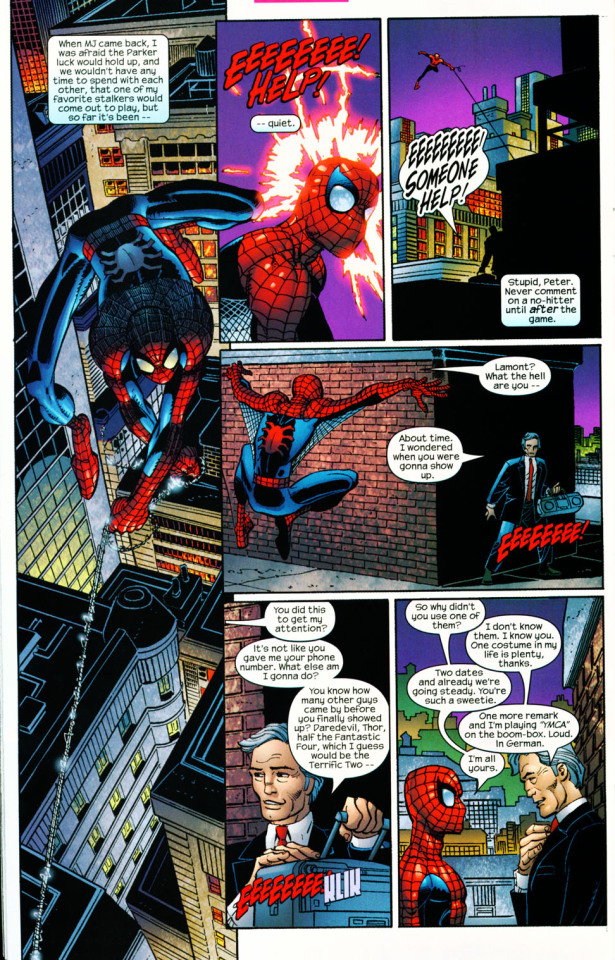
This oversight is particularly egregious since that period had only been a few years before the writing of this essay.
But it’s not as egregious as the other thing Fettinger said. That being Spider-Man has cost Peter his happiness.
Er....no.
There have been many things that have made Peter unhappy in the course of his superhero career but as ASM #500 clearly confirmed for us Peter, in spite of all that, is ultimately happy. Which was a big deal as Peter had just relived all his old battles at once.
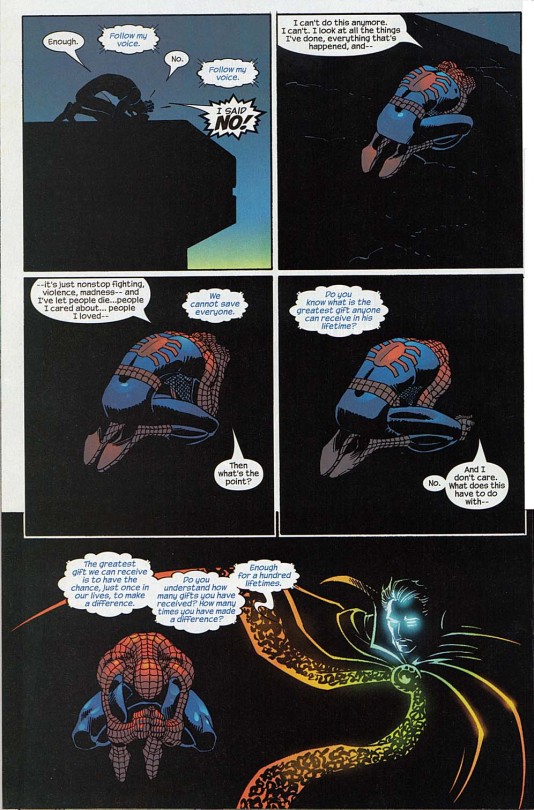
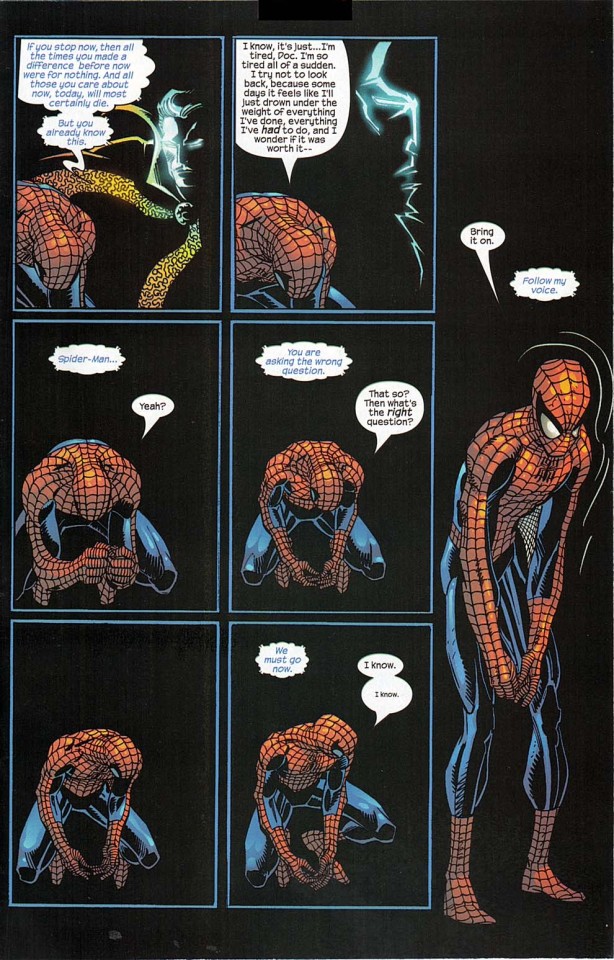
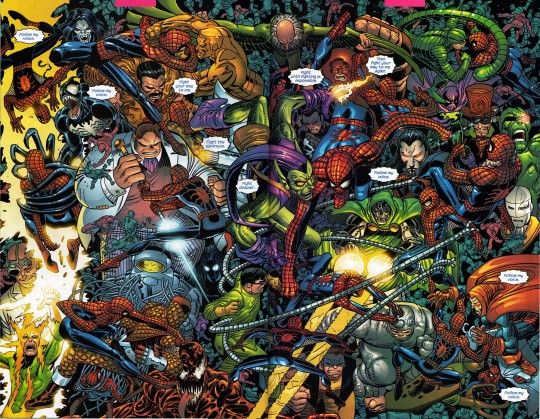
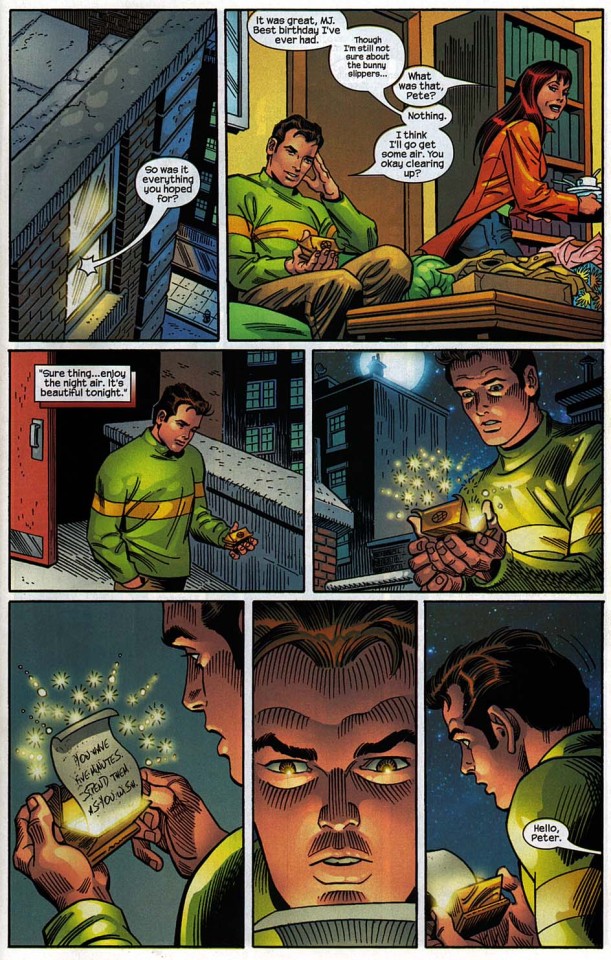
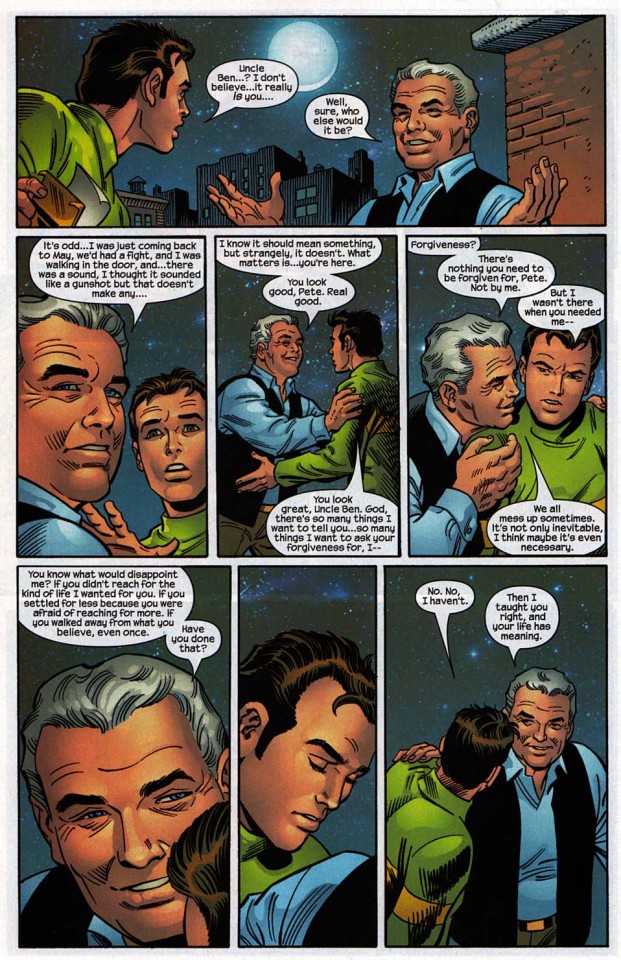
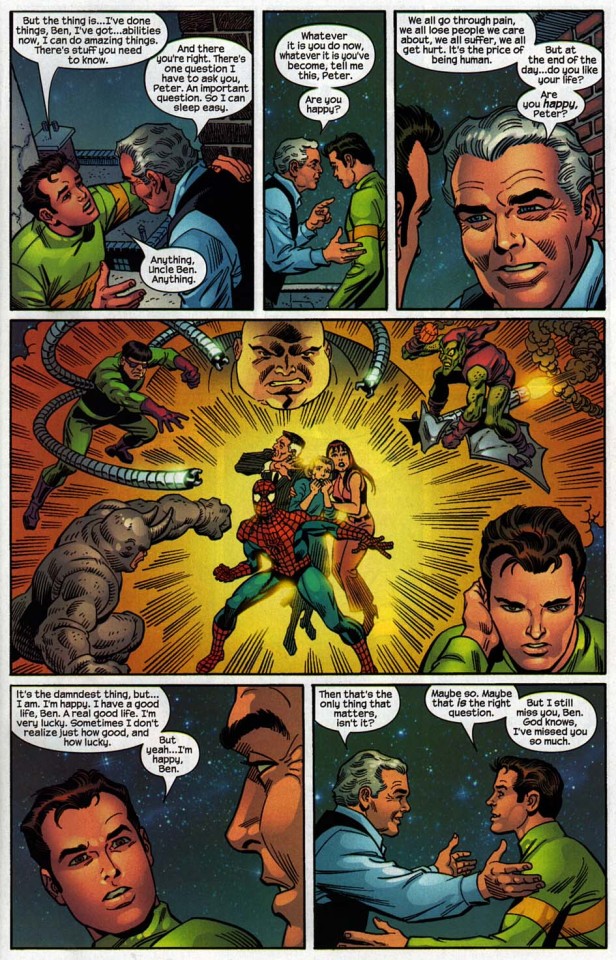
The omission of ASM #500’s ending is telling because Fettinger actively dislikes the story and the scene with Uncle Ben particularly. He’s labelled it as ‘banal’ and essentially said if he could talk with his own deceased father the conversation would’ve gone very differently. Problem is the the story was not about him and his family but about Spider-Man and HIS family!
Fettinger then asks if when Peter dies he’d be labelled as someone who fell short of his potential. He illustrates the point by comparing 15 year old Spider-Man to adult Spider-Man circa 2006.
He claims Peter made few adjustments to his fighting skills. Not true. The older Spider-Man beyond the Silver Age did in fact adjust some of his fighting skills, noticeably in regards to ramping up his speed during combat.
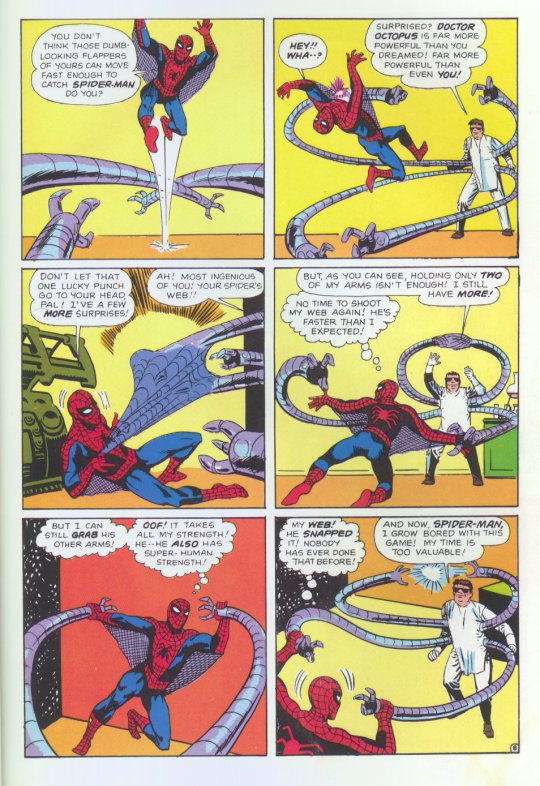
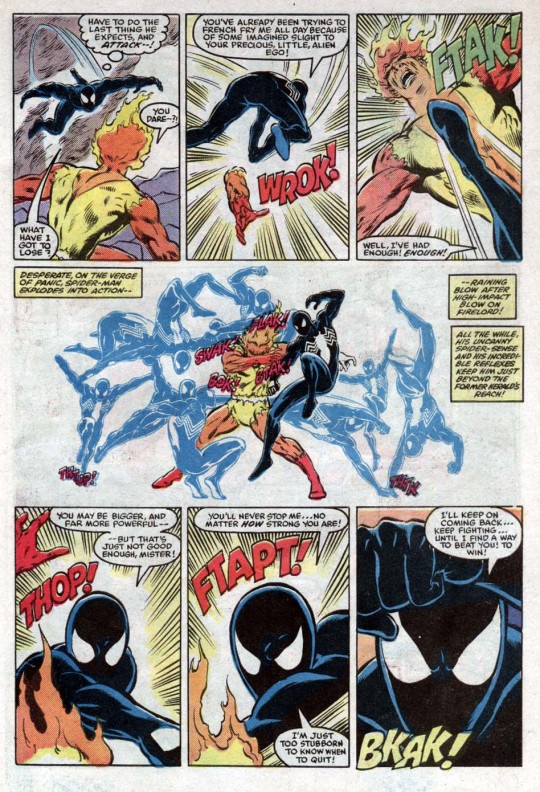
He also took martial arts lessons from Captain America in FNSM v1 #1, putting the techniques he learned from that into practice in the very same issue. That issue was published just a year before Fettinger’s essay by the way.
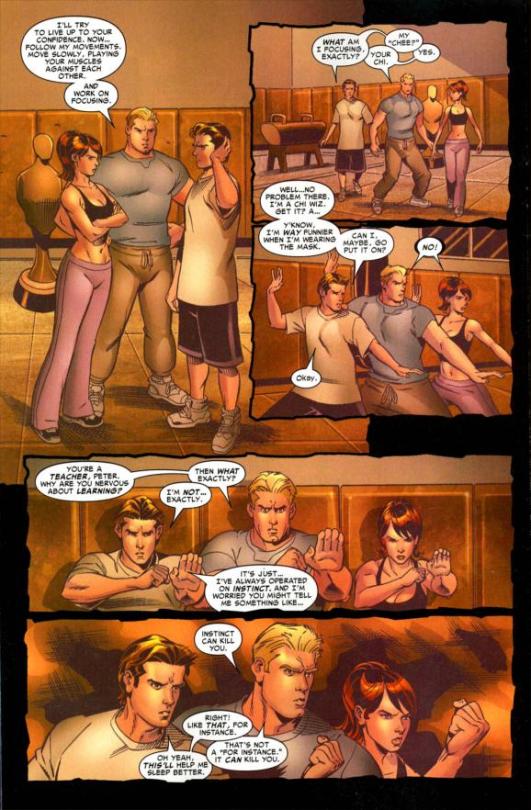

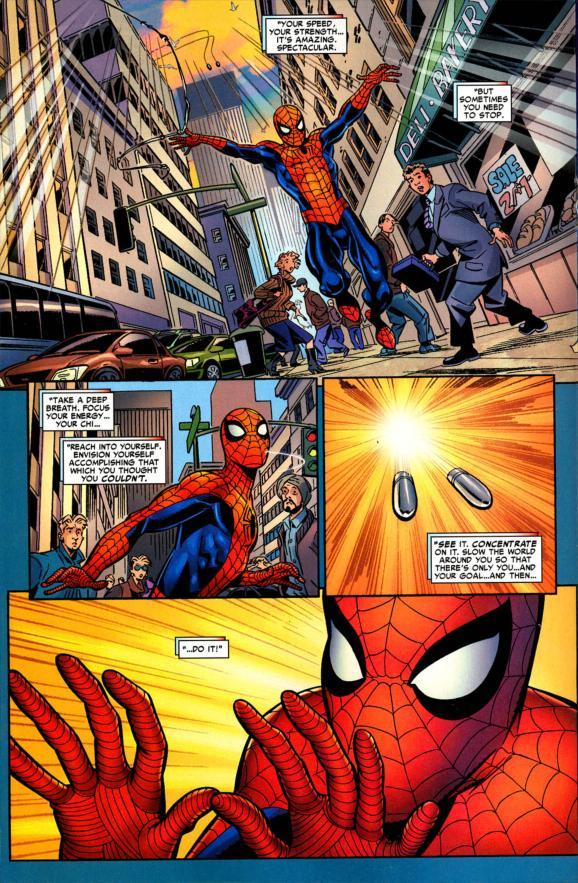
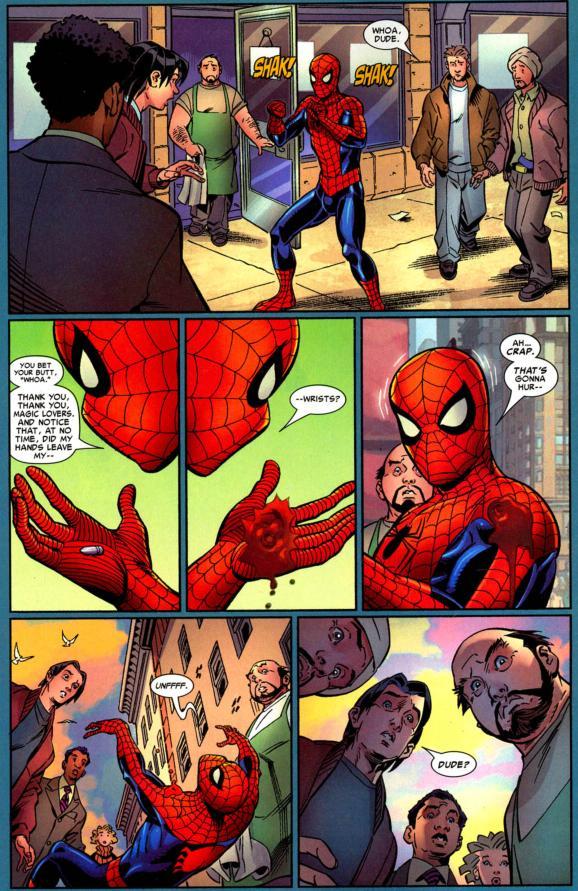
Granted these do not seem particularly significant.
But let’s flip the script a little bit. Let us presume Fettinger to be correct, Spider-Man between 1962-2006 had never evolved his fighting style significantly.
Is that really an example of Peter doing himself a disservice, of not fulfilling his full potential...or is it that the fighting style he had was not only adequate for the life he lived but in fact optimum?
Spider-Man after all has an incredibly effective and sophisticated fighting style. It is impossible to truly replicate by anyone exempting those of similar powersets to himself.
His immense strength allows him to plant himself on the ground and exchange simple punches, kicks, etc. with a lot of power behind them.
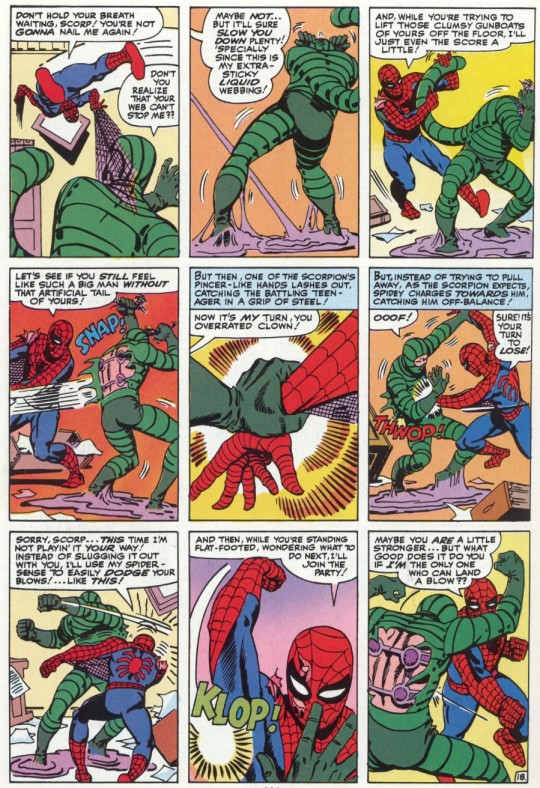
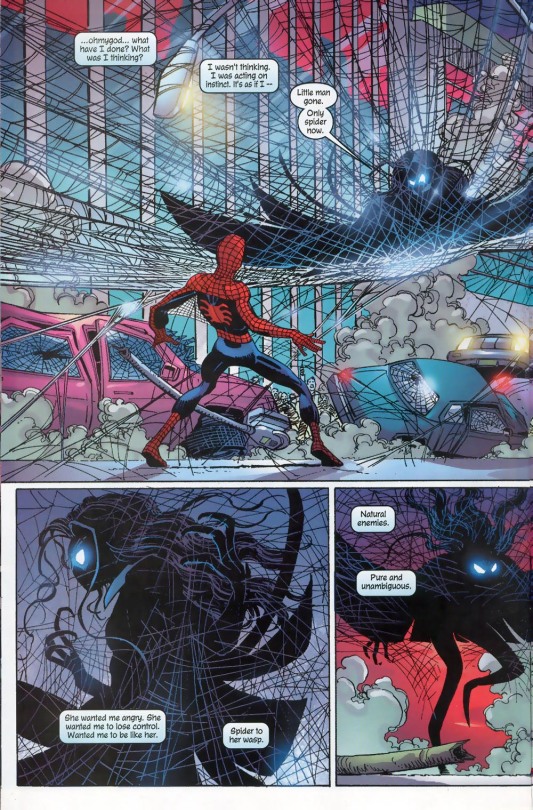
But with more room to manoeuvre his speed, wall crawling, web-slinging and agility allows him to augment that raw power to deliver a lot of hits in a short space of time from a near 360 degree axis. See his battle with Firelord above)for proof of this.
His webs can be used concussively, to distract, to incapacitate and can even act as a defensive shield.
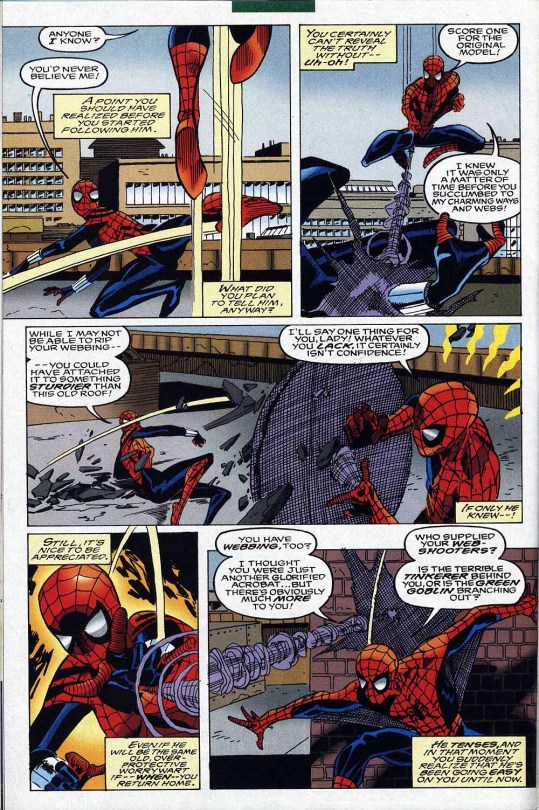
(I know the Spider-Girl image isn’t 616 but it might as well be if you know the contex behind the story)
And then there is his ace in the hole, the Spider Sense. This ability is linked to his reflexes and intuitively enables him to know an attack is coming. It almost automatically makes him adjust his movements accordingly in conjunction with his immense reaction speed and agility.
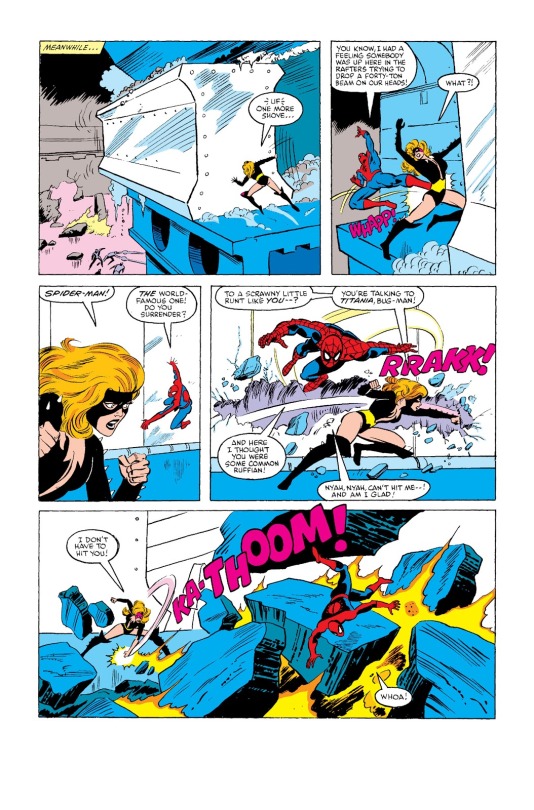
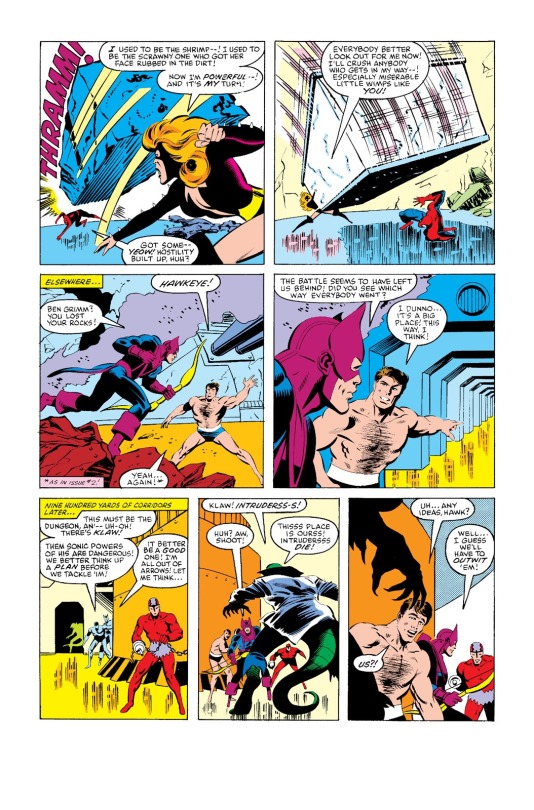
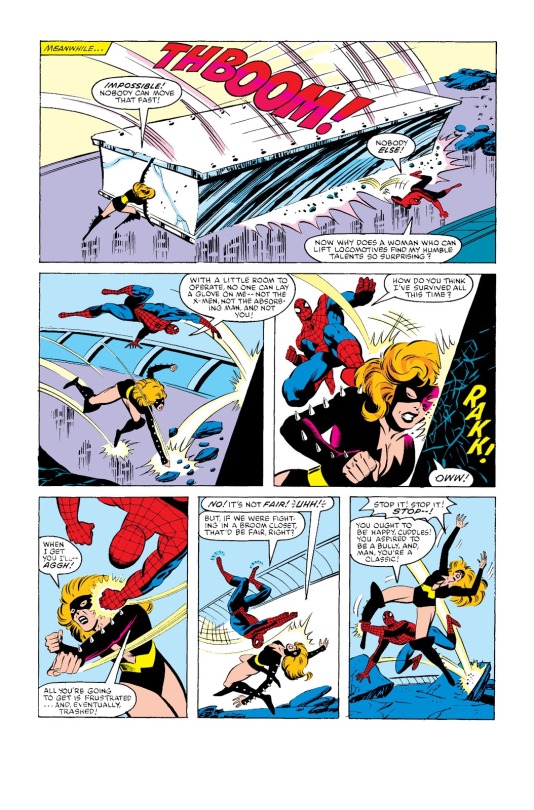
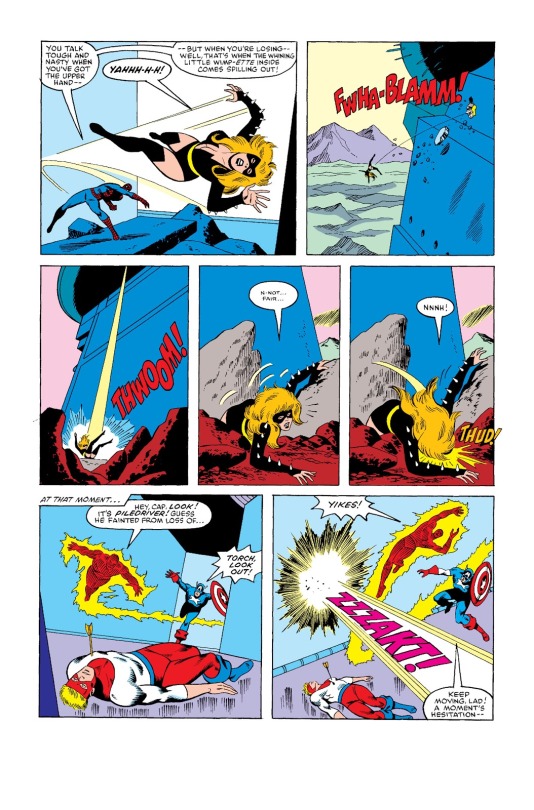
This fighting style had been enabling him to defeat a wide variety of foes across what was then 44 years of published stories.
So was it really that Peter was slacking off in not evolving it? Or was it more that he early on developed something extremely effective that didn’t need any real reinvention?
Moreover isn’t it impressive (rather than a point of condemnation) that Spider-Man essentially figured out the best way to fight with zero instruction or training when he was just a teenager. That’s incredible so it’s far from something to chastise him for simply because he hadn’t radically altered it.
What’s worse is Fettinger claimed that Peter ‘continued’ to rely upon sheer strength, raw intelligence, dumb luck and the stupidity/lack of imagination of his foes to win the day.
Let’s put aside for the moment how Peter has whipped up gadgets or chemicals when needs be.
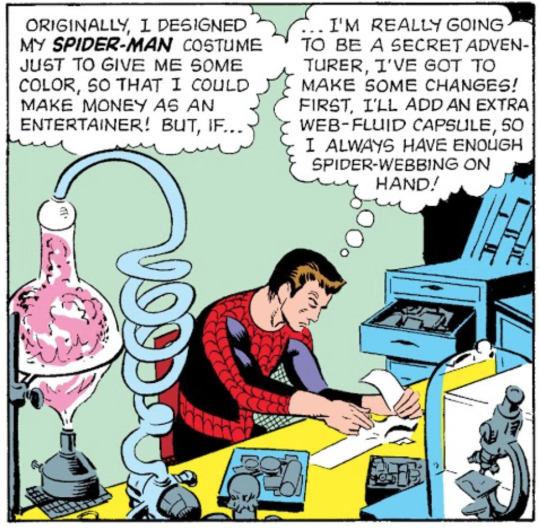


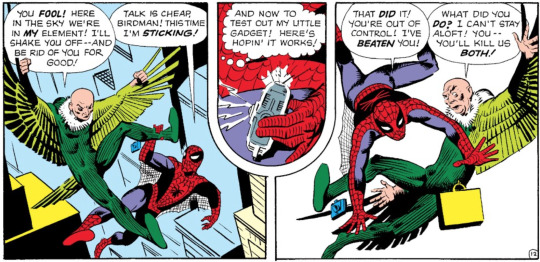

Let’s also ignore how his foes even upon trying new tricks have more often than not met with defeat anyway.
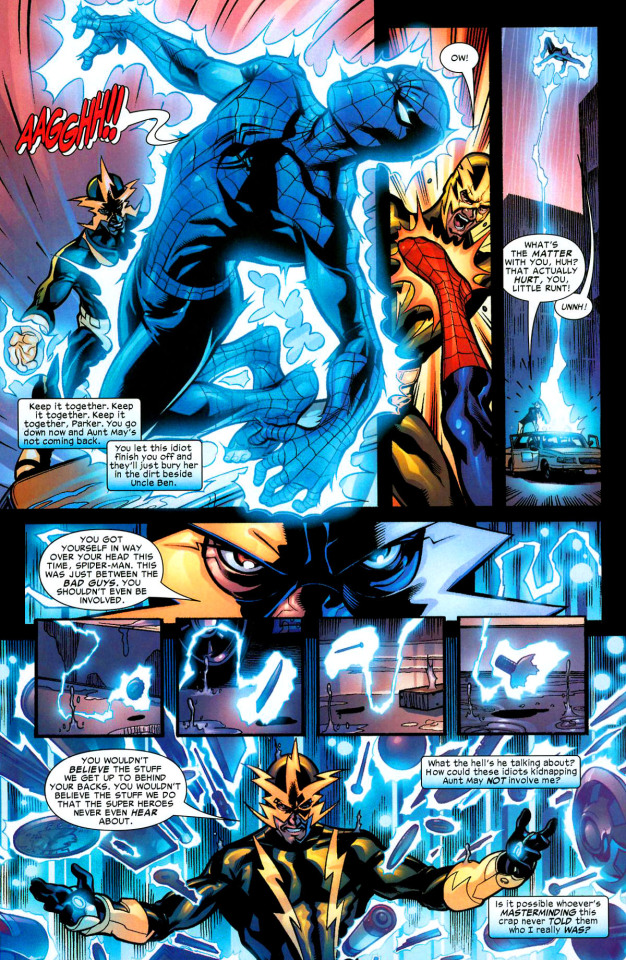
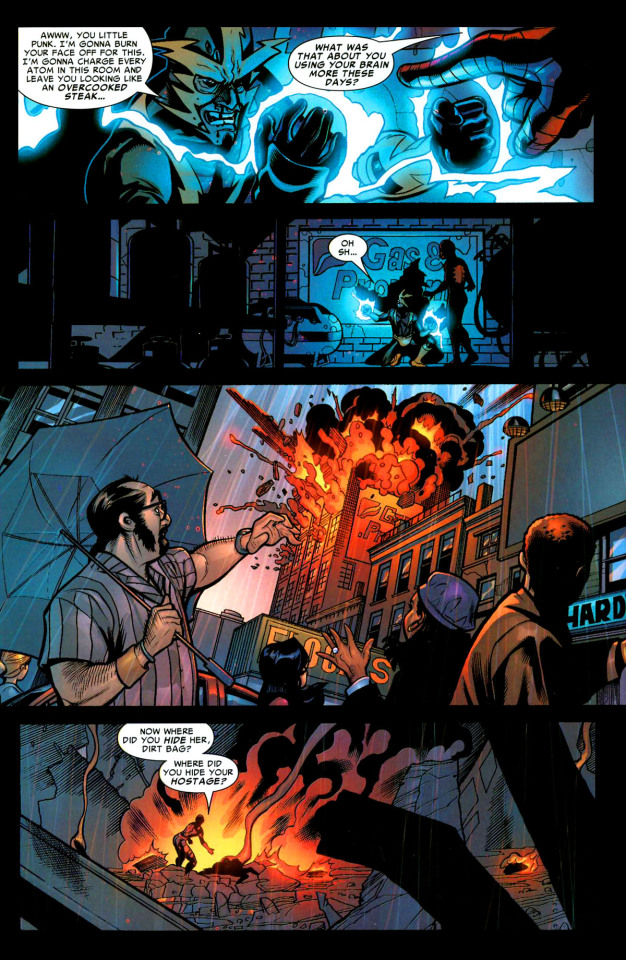
Let’s also entertain the idea that Peter truly does rely upon his foes stupidity and dumb luck in battle. Let’s do that even though he absolutely doesn’t, he’s very rarely just presumed he can win because a villain is dumb, but he has exploited that fact when presented with it; see 99% of Rhino fights. Hell let’s even ignore how Spider-Man uses his speed, and agility and webbing and spider sense in battle as much as his strength.
What exactly is Spider-Man supposed to rely on besides his sheer strength and raw intelligence?
Fettinger is calling Spidey out for relying upon his raw physical powers and his intelligence.
Like...what is an MMA or boxer supposed to rely on besides their muscle and their mind to strategize before and after a fight?
Fettinger continues to point out that exempting his Iron Spider outfit or his alien costume Peter has continued to rely on his ‘wash n’ wear red and blue pajamas’.
There are two waysto view this statement. Either Fettinger is being critical that Spider-Man has not opted to alter his costume aesthetically ever or else never opted to alter it in terms of being functional. That is to say it’s still just a piece of cheap cloth.
Both arguments are invalid criticisms.
Peter has changed his look more than once throughout the years, noticeably he wore a cloth version of his black suit, used two rubber insulated outfits to fight Electro, made an armoured costume in Web of Spider-Man #100 and used four different costumes when he adopted four new identities for himself, all of which were used for different functions.
The black costume however served no function beyond enhanced stealth and Peter retired it due to him and his wife not liking how it reminded them of Venom, a notorious publically known homicidal maniac.
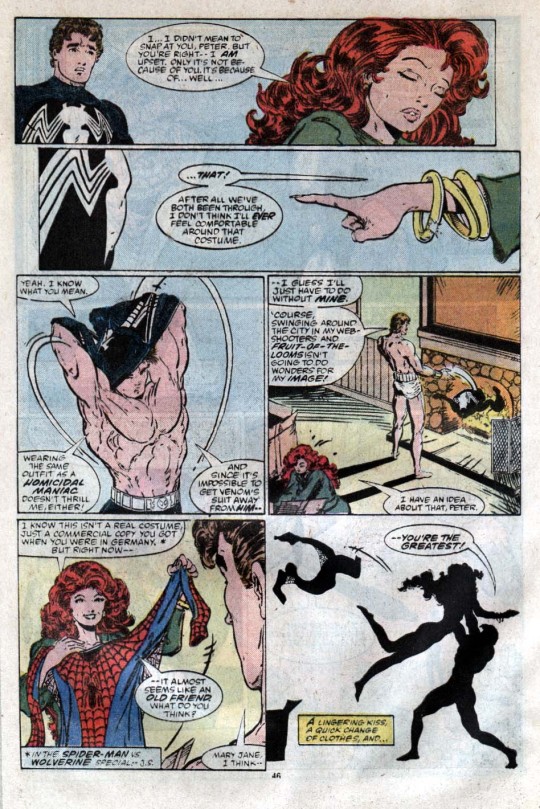
The Armoured suit was only created with access to ESU’s scientific resources, was destroyed on its first mission and realistically was compromising to Spidey’s fighting skills (hence Slott’s version was redesigned). It was also impractical as it was composed of a new hardened version of Peter’s webbing meaning it was never going to last anyway.
His rubber suits were similarly impractical for continual use and severely damaged during battles with Electro. They could not be worn as casually as his standard suit, realistically would’ve impeded mobility to a certain extent and were designed for one specific foe anyway. In fact Spidey usually ran into Electro by chance or else with limited time to intervene in his crimes. Meaning he’d not have the time to locate the rubber suit anyway. Besides...he usually managed to beat Electro without it anyway. After all rubber gloves would be a fairly effective defence and his webbing was itself an insulator. That was his go to in Electro’s debut in ASM v1 #9 and brought up in New Avengers v1 #4.
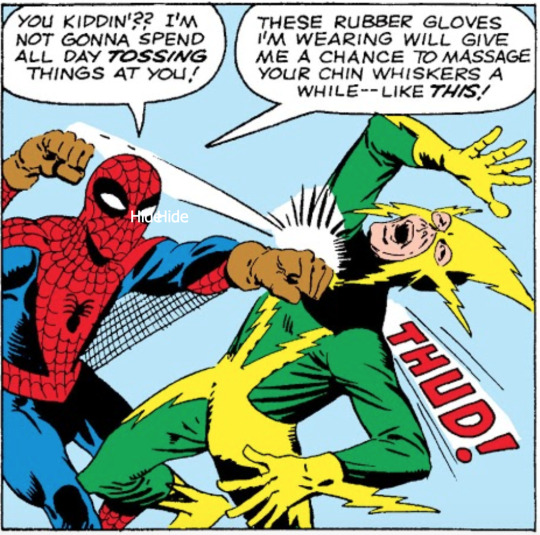

True Spider-Man trashed his original rubber suit for seemingly no good reason, but since this so aggressively makes no sense I think it’d be safe to presume Peter’s rationale was that the suit itself was ineffective (it didn’t provide full insulation) and was literally held together by glue. The suit was likely unusable after the battle hence why Spidey trashed it.
The four new identities he created though are the hardest to defend. It really doesn’t make much sense for him to have retired those identities beyond the simple fact that, well...the book is called Spider-Man not Hornet/Ricochet/Dusk/Prodigy. I suppose you could go so far as to say pretending to be other people and not using his web-shooters compromised his fighting abilities as he had to consciously move and talk differently as well as use different weapons and tactics. Also maybe he heard about how well multiple alter egos went for Moon Knight. The costumes were to be fair stolen from him and used by other people meaning he’d have had to come up with entirely new identities for himself and ultimately Peter would prefer being Spider-Man having come to see it (for all it’s burdens) as part of who he is.
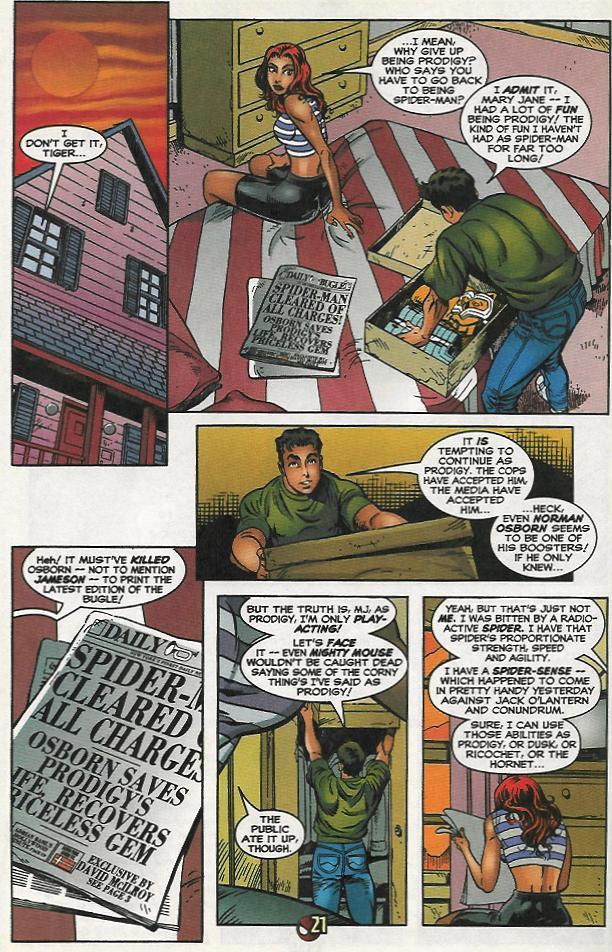
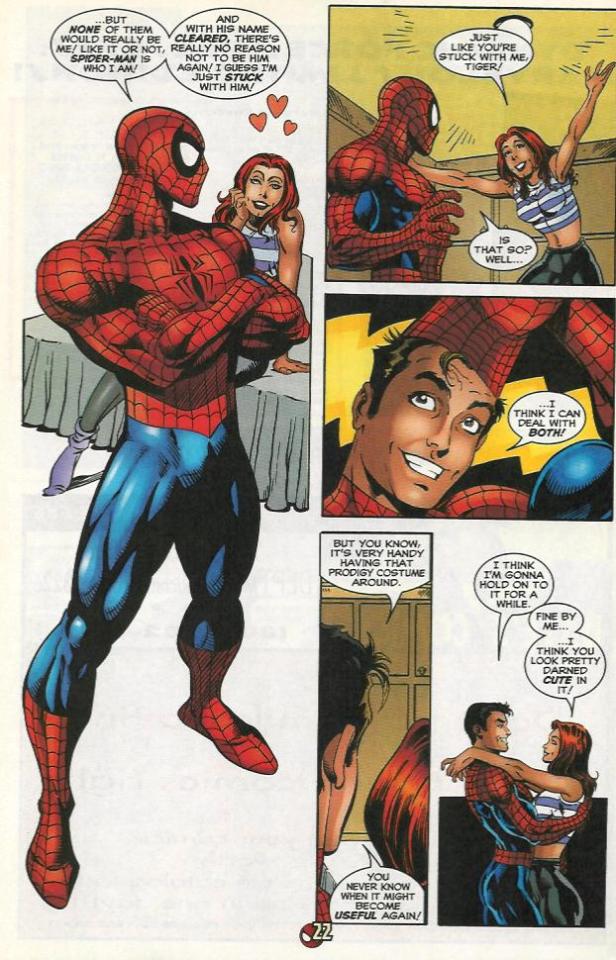
So contrary to Fettinger’s criticisms, Peter HAS changed his costume, but from a practical/functional point of view there really is little reason for him to permanently make any changes. Or else when he has done so extenuating factors have compromised his attempts.
Meaning all that’s left is Fettinger’s complaint that Spidey never changed the outward aesthetic. Which is not a legitimate complaint about his ‘unfulfilled’ potential. I’ve kept the same posters in my room for many, many years. It doesn’t mean I’ve failed in my potential. It just means I can’t be bothered to change them/I have grown attached to them.
Fettinger continues his train of thought by talking about how Spider-Man’s webbing and web-shooters have not significantly changed since his early days barring his adoption of organic webbing.
I will give Fettinger some leeway here. He never said the webbing/webshooters have remained totally unchanged, just that they’ve mostly remained unchanged. So stuff like Peter equipping a spider tracer trigger to his web-shooters, sedative stingers, impact webbing, an LED light to tell him when he’s low on ammo and adjusting the design and formula of the webbing over time I am lumping all under ‘mostly not changed’.
Even though objectively by 2006 the web-shooters had changed.
But again why does this demonstrate unfulfilled potential?
Spider-Man’s web-shooters are a brilliant feat of scientific engineering/chemistry and have served him well across the decades.
They didn’t need to be radically re-invented.
True, Ben Reilly found ways to improve upon them which Peter later incorporated. Does this not prove Peter was slacking off, of failing to live up to his potential?
Yes and no.
Yes because there WERE improvements he could have made.
But no because Ben had access to Seward Trainer’s scientific resources, less social responsibilities, a lot more time on his hands and was in many ways far less stressed out. As such he was better able to spend time dreaming up those improvements.
Said improvements by the way equated to wearing the web-shooters on the outside of the wrists, sedative stingers and impact webbing and he had FIVE years to dream all that up.
So you know...hardly him re-inventing the wheel.
The truth is if Peter had been in a similar position to Ben, he would’ve likely dreamed up the same improvements.
But he evidently didn’t need to since the web-shooters worked just fine. Ben himself didn’t spam the stingers or impact webbing during his career as Scarlet Spider or Spider-Man. Nor did Peter in the years after he integrated most of Ben’s adjustments into his own web-shooters.
And he did just fine most of the time.
Any further upgrading to his web-shooters, like the kind we saw in Parker Industries, would’ve required access to resources Peter simply didn’t have.
Fettinger continues that Peter’s relationship with the public he serves is tenuous at best.
Again, this is not an example of unfulfilled potential. This is the result of Spider-Man’s reputation being slandered by Jameson and the wider press getting in on the act. This was proven in ASM v2 #39 wherein Aunt May, decades after Spidey began his heroic career, attempted to find a newspaper that didn’t have a negative bias towards her nephew and struggled to do so.
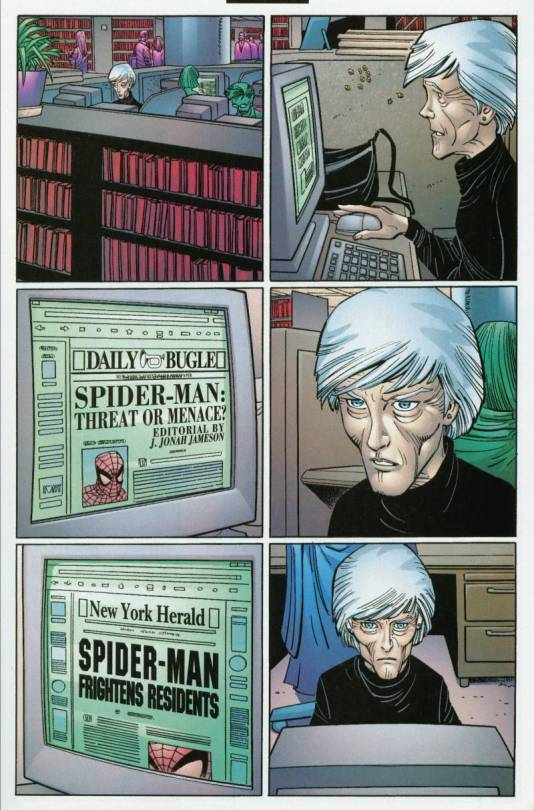
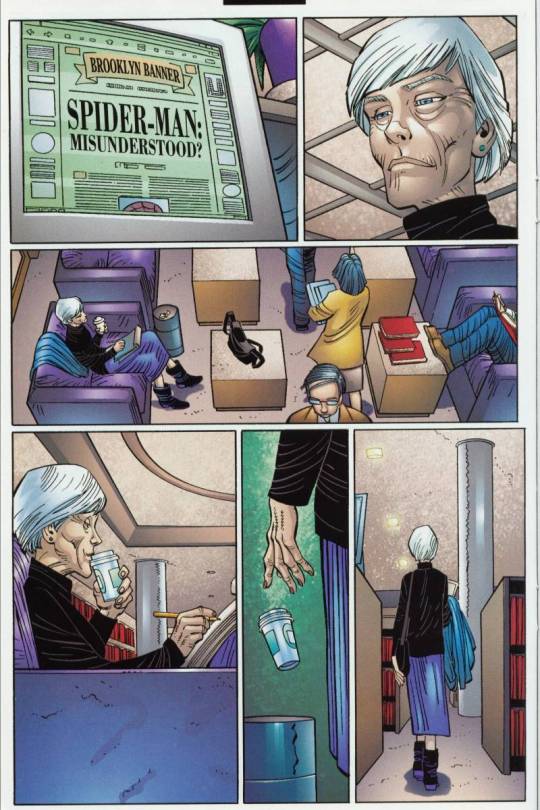
In New Avengers v1 #15 the Avengers attempt to win Jameson over due to Spider-Man’s involvement with the team only for him to turn on the team collectively.
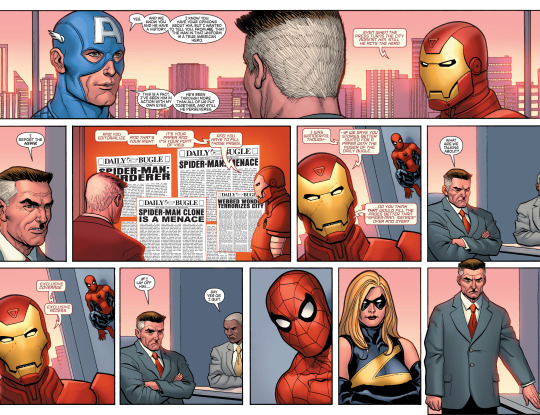
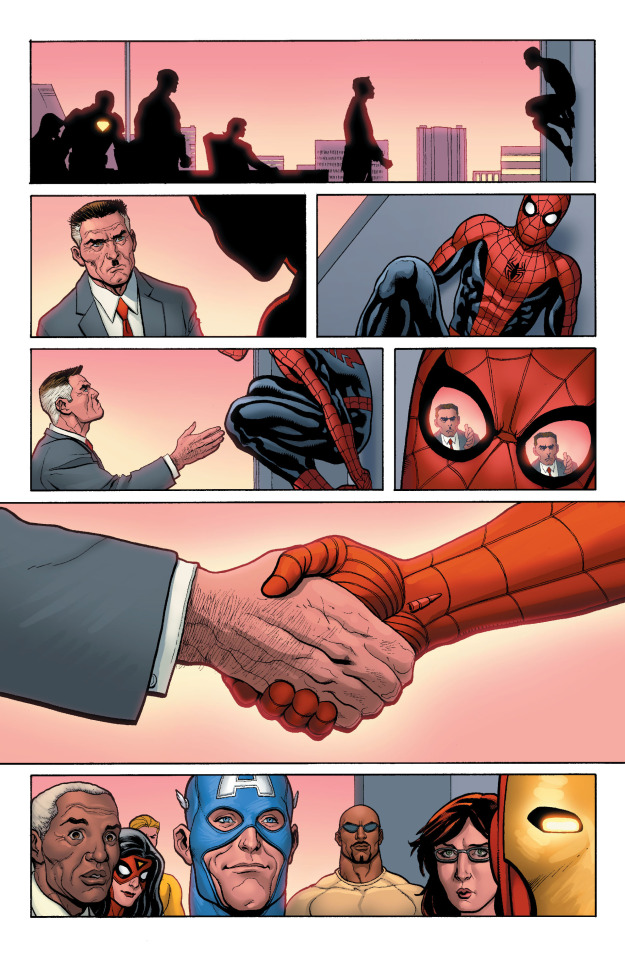
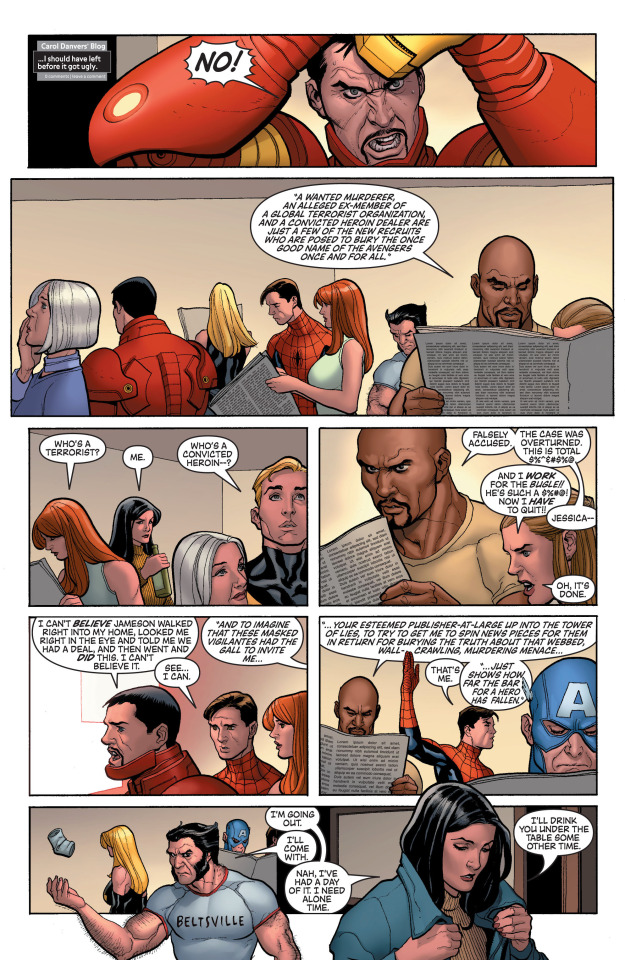
Combine that with:
a) The numerous times Spider-Man has been framed for crimes he was guiltless of
Or
b) The instances where he was deliberately painted in a negative light, such as when he assaulted a seemingly innocent Norman Osborn in Spectacular Spider-Man #250
And it was summarily not Spider-Man’s fault that in his 15 year history his public relations had never been great. Nor was it a negative reflection upon him that he’d been unable to improve them in that time
The public have been fed a particularly strong and buzz worthy narrative for so long that it’d be difficult for him to ever rehabilitate his public reputation without working for the authorities legitimately, being pardoned for any real/perceived crimes he’s been accused of and unmasking publically. Even then it’d be no guarantee.
Not to mention (though Fettinger could be forgiven for not taking this into account from a 2006 perspective) in the world we live in today it’s sadly apparent that news stories about how bad things are simply sell much more than stories about something positive.
Fettinger continues to say that in spite of Spider-Man’s dalliances with team membership his stubborn independence and feelings of inadequacies ensure he remains a loner and at times a fugitive with many heroes regarding him as poorly as the villains he fights.
This for me was possibly the greatest ‘what the fuck’ moment in this essay.
Stubborn independence. Okay, maybe? Although the message of his role in the then current ‘Civil War’ storyline was that surrendering his independence was a bad thing! By unmasking, surrendering some of his independence to Iron Man and working for the government Peter found himself in an inevitable position. He was trapped from doing the most good by a corrupt system. A system that was actively demanding he help do bad things by rounding up fellow heroes and removing their civil liberties. And in the process he made his friends, family, colleagues, students and general acquaintances targets!
Fettinger didn’t know this at the time, but in truth when you follow the chain of events, joining the Avengers is what led to One More Day.
If Peter hadn’t joined the Avengers and let them know his identity, Charlie Wiederman wouldn’t have gotten approval for his experiments from Iron Man.
If he hadn’t performed his experiments he’d have never become a freak.
If he hadn’t become a freak he wouldn’t have eventually burned down the Parkers’ homes.
If they hadn’t been homeless Iron Man wouldn’t have offered them Avengers HQ to stay at.
If they hadn’t been living there Tony wouldn’t have taken Peter under his wing.
If Tony hadn’t done that, if the Parkers weren’t beholden to him for the roof over their heads and if Tony didn’t know who Peter was, there’d have never been an issue about Peter unmasking publicly in support of the Super Human Registration Act.
If Peter hadn’t unmasked publicly Kingpin wouldn’t have put a hit out on his family.
If Kingpin hadn’t put the hit out Aunt May would never have been critically injured.
If Aunt May hadn’t been critically injured there’d have been no need for a deal with Mephisto to save her life.
Joining a team led to one of Spider-Man’s darkest hours and ultimately his greatest defeat.
So you know…maybe there is something to be said for ‘stubborn independence’.
Moving on…feelings of inadequacy? That’s heavily debatable. Again, see ASM #500. Peter was an ultimately happy person. He had a firm sense of pride throughout his life as much as he’d beat himself up. His inadequacies always came in the form of ‘I could/should have done more to help’.
Typically inadequacies manifest as ‘I’m just not worth it’. Even if you disagree and argue they are more like ‘I’m not good enough’ the context is still different. Whenever someone laments ‘not being good enough’, it’s almost always coming from a selfish mindset. Peter in AF #15 was frustrated about his inadequacies before going off on a power trip. But the older Peter’s frustrations were about his inability to do more for others! Superficially they might be called the same thing, but the internal psychology behind them is very different. Fettinger is attributing the former mindset to the latter iteration of the character.
It didn’t even really apply in the early years of the character. After all his problem in ASM #1 when he tried joining the Fantastic Four was about being too cocky (understandable given his age and experience as a performer) than about feeling himself to be somehow ‘not good enough’ for the team.
But then you get to the part here Fettinger claims these inadequacies and independent streak ensure Peter will at times be viewed as a fugitive. And that’s the point where I began to question near damn everything Fettinger has ever said about the character.
That’s not about Peter.
That’s the result of Jameson and super villains. If he wasn’t so independent or felt so ‘inadequate’ then I fail to see how that’d change his situation beyond other heroes disbelieving the news and vouching for him. But his various friends in the superhero community for many years never fully believed such slander anyway, especially since some of them had been victims of similar stuff themselves.
For instance, circa 1996 (let alone 2006) I find it fundamentally unbelievable that Daredevil or the Human Torch of all people would ever honestly entertain the idea that Spider-Man simply assaulted an innocent man in Spec #250 or (beginning in Peter Parker: Spider-Man #88) that he actually murdered low rent thug Joey Z (a crime Osborn framed him for).
More mind boggling though is Fettinger’s assertion that Spider-Man was (and always had been) a loner precisely due to his independence and inadequacy. This is utterly inaccurate because by 2006 Spider-Man was (to much consternation within the fandom) a member of the Avengers!
He’d been one for 1-2 years at the time of this essay’s writing and it’d been a MASSIVE deal. With hindsight we know that to some extent Spider-Man more or less held some form of Avenger’s status up until 2019, around 15 years after he first joined.
The idea of Spidey always being a loner was also aggressively contradicted by Spectacular Spider-Man #75-100. In those issues Peter and his girlfriend the Black Cat formed a crime fighting partnership. Yes they were lovers but the point is Peter was more than capable of accepting an on-going team arrangement. True their team fell apart with the end of their romance, but that had little to do with his independence or his feelings of inadequacy. Peter broke up with Felicia because she’d lied to him and didn’t value him beyond his Spider-Man identity.
That doesn’t touch on his independence at all and more importantly is an example of Peter doing something because he had too much self-respect to continue to be with someone who didn’t value him properly. Which is the opposite of things failing because he had issues of inadequacy.
Heck Spidey at one point tried to form his own superhero team, the Outlaws.
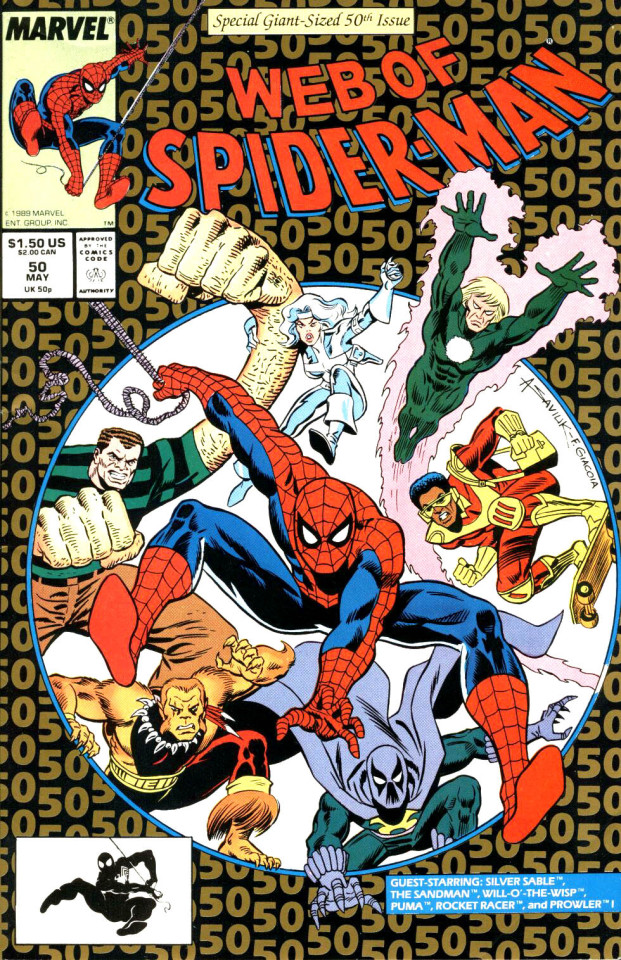
What’s worse is that Fettinger himself wrote a detailed essay about Spidey’s history as a team player.
I’ll leave it there for now. We’ll continue covering the introduction next time.
Master Post
#Spider-Man#Peter Parker#Avengers#New Avengers#Marvel#Marvel Comics#mjwatsonedit#Mary Jane Watson#Mary Jane Watson Parker#mj watson#Norman Osborn#J. Jonah Jameson#miles warren#George Stacy#Captain Stacy#Ezekiel Sims#Black Cat#Felicia Hardy#Aunt May#May Parker#Civil War 2006
8 notes
·
View notes
Text
hi! can I get a matchup for mlqc, ikerev and dfel? Virgo, intp, 9, and very evenly divided between all four houses for Hogwarts. i’m 5’1.75" with curly hair just past chin length dyed in a gradient from my natural ginger to Ruby to amethyst to sapphire hair and eyes that change colors under different lighting. Very petite and pale, freckled.
i’m a performing introvert, so while I can come off as an extravert in reality I’m deeply introverted. I make friends easily, especially with animals (which I love dearly!). I’m very stubborn and persistent when it comes to those I care about, but otherwise am very open and free flowing, following the wind and my intuition. Love to learn, seeks understanding, empathetic, and analytical.
I’m a creative writing and Eastern Asian studies double major with minors in literature and music performance. I love stories, reading and writing them, and creating all kinds of art whether it be on the 12+ instruments I play, singing, or visual arts. I’m a varsity fencer, my main weapon of choice being foil. I’m incredibly hard to offend or bother. I love adventures and exploring new things – especially when it comes to food and art and stories. I love soft things and pillows.
Often described as passionate, enthusiastic, talkative, and dramatic, I actually am very anxious and can be incredibly reserved in private, often closing off lots of personal information and only disclosing it to those closest to me when absolutely necessary. Due to suffering from chronic nightmares, anxiety, depression, and PTSD I often underneath the energetic exterior exhausted and dealing with extreme difficulty keeping it up. Gifted kid burnout, and heavy imposter syndrome. Comes from a successful family with 6 older siblings and as such has developed a strong desire for independence while constantly fearing hurting others or being forgotten or left behind.
Thank you so much and I hope I didn’t add too much!!!
—————————————————————————
No problem! In fact, more information helps me pick a match for you. Anywho, I hope you enjoy the matchup!
MLQC
I’d pair you with……….. Victor!
Honestly, Victor seems like the strongest match for you and it’s pretty clear in your description why the two of you would work. However, I feel like Kiro would also be a great option for you since he’s literally a ball of sunshine who’d be able to cheer you up within minutes. If it’s the rare occasion that he can’t, you can at least expect Kiro to be right by your side when trouble occurs. He’d be able to slow down for you without putting too much pressure.
However, Victor is the clear winner here. Although you’re an introvert, you are able to put yourself out of your comfort zone– which helps you interact with Victor at his colder states. It’s even better that you make friends quickly, helping you get closer to the CEO. While he finds the small talk useless, Victor appreciates that you’re trying to get close to him (because no one else wants to take the time to get to know him).
He also finds your passion for art and music very interesting. Although he’s not a music nerd, Victor understands the difficulty in playing 12+ instruments and commends you for your talent. From time to time, he’ll ask you to play certain instruments for him– even classical songs that you’ve memorized and he enjoys listening to.
Victor also likes to push you to your full potential. He notices that you often feel like a waste of talent, but that’s not what he sees. Although he’s not verbal about his support, Victor is willing to help you do your very best in all your goals and assignments.
He also appreciates the fact that you’re empathetic towards his feelings while being analytical about other things. The duality is important and impressive to him because he needs someone who knows how to control their feelings (especially because he’s not in tune with his own emotions).
The only bump in this relationship would be the independence issue, but that’s ok because it would help the two of you strengthen the relationship in the long run. Although Victor is hesitant about leaving you on your own a lot, you prove to him that you are more than capable of taking care of yourself. As time goes by, he trusts your abilities more and finds your independence helpful in certain situations,
Another Possibility: Kiro
Ikemen Revolution
I’d pair you with……… Blanc Lapin!
Again, it seemed pretty clear to me that Blanc would be the winner, but Sirius wasn’t far off. The Queen of Spades is motherly, so he’d be able to attend to your emotional needs (especially if you’re feeling really bad). Also, it would be super cute to see you constantly trying to care for Sirius (because the poor man needs a break) as he tries to assure that he’s fine. But you’re too stubborn to listen and he’s secretly glad that you like to look after him.
However, I couldn’t pass the opportunity to match you with my favorite bunny man! You don’t have to worry too much about getting close because Blanc naturally does that for you. As he shows you around the Cradle, you don’t feel worried or uncomfortable. The two of you chat during your entire tour. You gobble all of Blanc’s fun facts and basics of the Cradle within minutes. He’s impressed with your memory and finds it endearing that you actually pay attention to his ramblings.
As a history person, you’d probably make connections between the Cradle and our world (especially East Asia). Although Blanc knows a few things about our world, he doesn't have extensive knowledge like you, so he’s always intrigued by whatever connections you make. He begins to ask you for more in-depth questions about East Asian history, and the two of you talk for hours. Blanc feels like he’s finally found someone who appreciates his interests with the constant discussions about the histories of the two worlds.
Blanc loves taking you for sight-seeing! Whenever he’s going somewhere that isn’t dangerous, he’ll always ask you whether you want to join him. If you’re down, then the two of you go around and make new memories. Every trip is an adventure and Blanc always gets you a plushie or something cute as a souvenir. It’s both bonding and exploring time!
While some consider Blanc’s smooth-talking as a bad thing, it also means that he knows how to comfort you when you’re feeling down or insecure. Although he doesn’t always have time to help you, the record-keeper knows exactly how to calm your nerves in a short amount of time. Even if he’s on a really tight schedule, Blanc always spares a few minutes to make sure that you’re alright.
Another Possibility: Sirius Oswald
Dangerous Fellows
I’d pair you with……….. Harry!
Not going to lie, my first choice for you is Lawrence (but no one likes his psycho, murdering ass). I could’ve written headcanons for you and pretend like he wasn’t insane, but that would ruin his character. Also, it’s not fun being paired with a killer, so I went with Harry instead! However, I do feel like you and Lawrence would do a great job at leading the team and ultimately form a deeper bond.
But enough of Lawrence, let’s get to Harry. Now Harry is definitely going to approach you first (mainly out of courtesy). He understands that it is difficult to adjust to their group, so he’ll be checking up on you quite often. Besides, he’s the only nice one so you feel more inclined to talk to him out of everyone else in the group.
Although simple talk can be hard (since there’s not much to talk about during a zombie apocalypse), the two of you manage. You talk about your passion for writing, which Harry finds really cool. He inspires you to write a story about the gang, where everyone manages to escape without any casualties. It’s hard to combat your writer’s block, but Harry’s enthusiasm inspires you to get a strong start. Soon, this writing becomes your way of coping.
You’re able to use your fencing skills for a foundation for zombie combat. Harry is surprised and amazed that you have a strong athletic background, so he starts taking combat lessons from you. At first they’re strictly combat, but the lessons ultimately give you two more time alone for bonding. When the two of you become official, there’s more kissing than combat.
Both of you have crying sessions together. Since Harry bottles up all his troubles, he doesn’t have any other opportunity to vent his frustrations. While it may seem sad as the two of you cry and hold each other, it’s also comforting to know that neither of you is alone. If either one of you is having an episode, the other is always ready for emotional and physical support.
Another Possibility: Lawrence
4 notes
·
View notes
Text
Appleton Estate’s Joy Spence, the First Lady of Spirits, Wants to Get Rum Into Whisky Drinkers’ Hands

When Joy Spence joined Jamaica’s Appleton Estate 40 years ago as chief chemist, it was a fitting start for someone whose name is Joy. From her research job next door to the Appleton distillery in Kingston, she couldn’t help but notice how much more fun it looked than what she was doing: “I’d see that everybody looked happy and busy and I said, ‘You know, that’s a happening place to work!’” She sent her resumé, interviewed for a position, and became Appleton’s first chief chemist, a role created specifically for her. (One minute in her infectious presence makes this turn of events entirely believable.)
With those auspicious beginnings, then-master blender Owen Tulloch quickly noticed Spence’s exceptional sensory capabilities. In 1997, she succeeded Tulloch as Appleton’s master blender, a position no woman had ever held for a major spirits brand. (Similarly, no woman had the title of master distiller until 2006 when Joanne Moore became master distiller for gin’s G&J Distillers.) Once appointed, she set a precedent for the spirits industry at large.
Over her 24-plus years as master blender of the Campari-owned rum brand, Spence has been responsible for more bottlings than she can remember: “Do you know what? I’ve never counted it, there are so many!” she says, and laughs. Under her direction, the Appleton Portfolio currently includes five releases — a Signature blend and four age-statement expressions — and a rotating cast of limited-edition labels, including the eponymous Joy blend she created to commemorate her 20th anniversary in her role in 2017. New expressions in 2021 alone include 15-Year-Old Black River Casks; a reimagined and repackaged 21-Year-Old Nassau Valley Casks; and a bottling to be released later this year honoring Spence’s 40th anniversary with Appleton.
Spence recently spoke with VinePair about the importance of chemistry in rum, the current climate for women in the spirits industry, misconceptions about premium aged rum, and bringing joy to everything she does.
1. Your background is in chemistry and you almost pursued a Ph.D., and had interest in medical school. What sparked your interest in the spirits industry?
I was actually lecturing in analytical chemistry at Jamaica’s College of Arts, Science, and Technology, and decided I wanted to get some industry (field) experience — and so, I actually started at Tia Maria—the coffee liqueur—as a research chemist. Then [later] Appleton created a new position for me: chief chemist. My role at the time was to take the laboratory to first-world standards. I became totally fascinated by the world of rum, and realized I could use my sensory skills while applying my strong chemistry background to create a new profession for myself.
(Owen Tulloch, then master blender) recognized that I had all the necessary talents to be an excellent blender, so he took me under his wing and said, “I’m going to tutor you.” And it has never changed since; my love, my passion for the spirit has now become a part of my DNA.
2. In a recent interview you said that Appleton Estate got flack when they appointed you, a woman, as master blender for the brand in 1997. Do you think those attitudes still exist today for women in rum or spirits in general?
No, absolutely not, because there are so many women as master blenders in the industry now and that whole view has changed. It is recognized that women have brought a different dimension to the industry. So, it is much easier now for a female to get appointed master blender.
3. Did you have any women role models in the spirits industry when you were coming up as a future master blender?
It took a long time before other women were appointed master blenders, but at the time I remember that there was a Women in Spirits Forum in the United States, and Dr. Rachel Barrie (another chemist) from Scotland was part of it at the time, and I was so fascinated with Rachel and her expertise. She really encouraged me to continue along my path. At that time she still was not appointed master blender, but she was well known in the whiskey world.
4. What would you say to women who have aspirations for top blending or distilling positions in the spirits industry? As a pioneer and role model do you feel a sense of responsibility toward mentorship of other women?
My advice for women who want to enter the field is that they should really focus on their craft, and eliminate any negativity because you’re going to have some difficulties along the way, although the road is much easier now. You must be passionate about your craft, and most importantly, remain humble. I now spend a lot of time doing motivational talks in all-girls high schools, encouraging them to think outside the box for their careers, and to look at the wonderful career that I have had, not only using chemistry but my sensory skill.
5. Tell us about the process for helping to establish a GI (geographical indication) for Jamaican rum. How did that affect the quality and perception of the spirit?
It has been a long road developing the GI for Jamaican rum. I was really responsible for the technical side. I worked a lot with the Swiss Intellectual Property Organization, so they made several trips to Jamaica working with the rum producers here, and we are in the process now of doing a little tweaking to the GI. That process is underway and we are waiting for approval from the Jamaica Intellectual Property Organization. It’s created much more focus on Jamaican rum and people are much more careful now about declaring “Jamaican rum” on the label only if it meets those GI requirements. And it helps establish a perception of quality for the category outside of Jamaica.
6. What do you think is the biggest challenge for placing premium, aged rums such as Appleton bottlings as sipping alternatives for whiskey drinkers?
I think we have two big challenges. The first is lack of awareness from dark-spirit drinkers on premium aged rum. Because most of the time whiskey drinkers don’t include premium aged rums in their drinking repertoire. And it is something we’re working on changing by actively engaging with these consumers, showcasing the excellence that lies behind our rums.
The second biggest challenge is dispelling this misconception that rum is not premium or meant to be sipped, but just simply to be had in cocktails. This, coupled with the fact that we really don’t have a clear, defined rule for aging in the rum industry, creates this cloudiness in people understanding what aged rum is all about. But once we introduce a dark- spirit drinker to our premium aged rum category, they’re immediately converted. They are so fascinated with the complex flavors and notes, the craft and history. We cannot be compared to any other spirit. And tropical aging is very important because spirits would have to be aged three times longer on the continent to get the same flavor profiles that we get here in Jamaica.
7. What do you think are the biggest areas for opportunity for premium, aged rums in the future?
We have actually established what we call a Rare spirits group in Campari [the Rare division], so we’re focusing on our 21 Year Old, for example, and having a different type of consumer education in our Rare category. Education is extremely important, spending time with those dark-spirit drinkers who don’t understand what premium aged rum is all about. I find that the young professionals are being converted to premium aged rum, and so we need to spend more time with them, and help them understand how complex a spirit it is, and that you can enjoy it in the same way you would a fine Scotch or Cognac.
8. Which is your favorite Appleton expression to drink, and what is your favorite way to drink it?
I always say it depends on the occasion — and we have a rum for any occasion! But when I’m at home sitting in my garden, just looking at the doctor birds fly around, with my orchids, I tend to drink 8-Year-Old Reserve, but on those very special occasions it would be 21-Year-Old Nassau Valley Casks.
9. What is the best part of your job?
I’d say the best part of my job is engaging with consumers and spreading the word about premium aged rum and what makes Appleton Estate so unique and different from other rums, and just watching [consumers] enjoy our rums and [seeing] that they’re so fascinated that a rum can be so complex and sophisticated. To me, that is gratitude. That’s the joy of rum.
10. After 40 years, any plans to retire?
No plans to retire just yet! I still have some work left to be done.
The article Appleton Estate’s Joy Spence, the First Lady of Spirits, Wants to Get Rum Into Whisky Drinkers’ Hands appeared first on VinePair.
source https://vinepair.com/articles/joy-spence-appleton-estate-rum/
0 notes
Text
How to Choose a Career that You’ll Love (even if you don’t know what you want to do)
How do most people choose a career?
Well…they don’t. They stumble into a job after college, take whatever they can get, then follow one of the few paths available from that random job.
No wonder most people are frustrated in their careers.
But there actually IS a way to narrow down your potential interests to choose a career that you will love.
Ramit Sethi, our founder and career-path guru, has put together a Dream Job system that helps you explore ALL the careers you’re interested in, test each to see if you’d really enjoy doing them, and move on to other jobs if they’re not a good fit.
Here are some of our best tips on finding a career you love – even if you have no idea what you want to do.
1. Understand yourself and your personality
A good evaluation of your personality defines the kind of job you would fit into. And we’re not talking about taking a random career personality test and doing whatever it tells you to do – those tests are usually unrealistic, and can’t paint a clear picture of what really drives you.
Instead, ask yourself the following questions and let your responses guide your career search.
Bonus: Want to fire your boss and start your dream business? Download our FREE Ultimate Guide to Business.
What motivates you?
The first step in assessing your personality is finding out what motivates you. If you can’t answer that question on your own, turn to friends, family, and colleagues to understand your driving force. When do they recognize your eyes lighting up? Maybe it’s after you’ve helped someone, or when you’ve solved a difficult problem. Understanding what gives you energy can help point you in the right career direction.
Evaluate your skills
Some jobs tap into soft skills, like communication and personality, while others demand a particular academic skill set. For instance, technical jobs automatically require you to possess an analytical mindset/background. You cannot apply for a scientific research position when your only training is in art history. If you do want to make a career switch, that’s ok, but understand that you’ll likely need additional training.
Understand your weaknesses and dislikes
Have some self-awareness and get clear on your major weaknesses and dislikes. You may realize that you have poor delegation skills or that you hate team collaboration. You’ll need to recognize where you have weaknesses or outright dislikes. For example, if you don’t like talking to people, you probably won’t want to consider a career in customer service.
2. Make a list of potential careers to explore
One of the most daunting parts of choosing a career is picking just ONE job…that you’re supposed to do for the rest of your life.
“What if I decide that I hate doing X? Can I ever do something else?”
“What if I want to change careers in a few years? What do I do then?”
“What if I like to do LOTS of things and can’t decide where to focus?”
Just start by listing ALL the careers and job titles you might be interested in.
Anything you want to explore, just write it down.
Think copywriting sounds fun? Add it to your list.
You can imagine yourself as a marketing director? List it out.
Know someone that does inside sales and what they do sounds cool? Put it on the page.
Have you toyed with the idea of being a baker? Nothing is too left field. Write it down.
Ramit call this the Cloud Technique because your options are as open as the sky.
This lets you say “Yes” to EVERYTHING you’re curious about instead of constantly saying “No, I can’t do that because…”
Where should your ideas come from? Here are a few career brainstorming tips:
List any careers or job titles that caught your attention in the past.
Go to LinkedIn or another job listing site and read job descriptions. If anything catches your eye or seems like it’d be fun to do, add that to your list of potential ideas.
Think about the skills you already have or the ones you’d like to develop. Then, search for jobs that involve those skills. For example, do you really like design and being creative? See what jobs require those skills by searching online. Put these options on your list of potential careers as well.
Think about people whose jobs you envy. Have you always been jealous of your aunt because she is a tour manager with your favorite band? Write that down.
Bonus: Want to finally start getting paid what you’re worth? We show you exactly how in our Ultimate Guide to Getting a Raise and Boosting Your Salary
3. Research your top choices
Once you’ve tentatively selected a few job titles, it’s time to do some deep research. This is where you go from “Hmm…sounds interesting” to truly understanding what the job is about.
Remember: You don’t have to become 100% knowledgeable about these roles… just yet. You just want to learn as much as you need to see if a job is right for you.
Let’s use the job title of “engineer” as an example of what you’ll want to look for.
The first thing, you’ll want to do is get a bird’s eye view of the job:
What do engineers actually do?
What are the different types of engineers out there (petroleum, electrical, civil…)?
What kinds of companies do they work for?
You can find this info with a quick search through Wikipedia or Googling “introduction to [INSERT JOB].”
As you tackle those broad and sweeping questions, you may start to eliminate some options you originally listed. And that’s okay. In fact, that’s expected. Just because something sounds interesting in theory, doesn’t always mean it will be.
You actually want to narrow things down in this stage. If at any point, you run out of job titles on your list, simply go back to step three (with your new insights on what you want from a job) and start again.
Once you have a basic high-level understanding of the positions, you can dive deeper into the nitty-gritty details:
What does this job pay?
What type of educational experience is required?
What’s the trajectory?
What does the job look like on a day-to-day basis?
How many hours per week do they work?
Is there travel involved?
What makes a great engineer vs. simply a good one? Is it a strategic vision? Creative ideas? Quantitative skills?
What blogs/books/websites do they read regularly in order to stay “in the know?”
Bonus: Want to work from home, control your schedule, and make more money? Download our FREE Ultimate Guide to Working from Home.
The whole time you’re going through this process, ask yourself “Could I see myself doing this?” and “Is this something that still interests me?”
This process helps you discover what it is you truly enjoy. Once you’ve narrowed your list down again, you’re ready to hear from people who actually work in these roles. That’s how you guarantee this is the right career choice.
4. Conduct informational interviews
An informational interview is an informal talk you have with a subject working in your desired profession. It is the last step you take when deciding your career path.
You may have heard about informational interviews before, but few people actually take this critical step. Two things you need to know:
An informational interview is an opportunity to meet someone you’re curious about and learn from them. So if you’re curious what a product manager or engineer really does and want inside tips about the job, this is how you find that out.
People want to meet with smart people who are curious in the same things. That means you, if you send a great email, have insightful questions, and are interesting.
Here’s how to set up an informational interview:
Book their time
First, identify people who you’d like to speak to. Then, reach out with a friendly email asking if they’d be willing to meet with you. Here’s a sample email script you can modify and use.
Subject: Hello, Allen!
I hope all is well and that this email finds you in good spirits. I’m thinking of catching up on a few things regarding my career choice.
I read about quality control in large pharmaceutical companies and am passionate about it, but there is not much information on the ground experience. The job will have me on the production line, and I’m interested to know what that looks like and what should I be ready for? I know you are resourceful, given your over a decade-long career in the same line, which I admire greatly!
Would you mind virtually connecting with me for a brief period where I can get your ideas on quality control as a line engineer?
Please let me know a good time to connect.
Kind Regards,
Tommy
Keep it short. Go straight to the point and give a compelling reason.
Prepare talking points
You don’t want to show up to an informational interview with nothing to say. Prepare your questions ahead of time, and do a little research on the person you’ll be interviewing, too. This will help you connect with them while getting the most out of the interview.
Speak about your challenges truthfully
An informational interview is the perfect place for you to share reservations about the job you’re learning about. After all, you haven’t chosen it as a career yet. It’s better to find out that it’s not a good fit for you now than in the future once you’ve started in that line of work.
Be a good listener
Be attentive and take notes during your informational interview. Ask questions during the conversation. If you don’t know what to ask, you can always ask an open-ended question like, “Is there more you can tell me more about XYZ?”
Send a thank-you note
Sending a thank-you note is mission critical after an informational interview. Even if you don’t want to go into that line of work after the interview, you never want to burn a professional bridge by not following up. Drop the person you spoke with an email and let them know how their advice is helping you achieve your goals.
While a dream job falling into your lap is rare, you can systematically find one. We see many students struggle to get a job of their choice, and we step in to help. This is not to say that it is always easy. But it is possible.
Let us help set you up for success by guiding you on a career path you love. Let us help you in your quest to find your dream job.
Bonus: If you’re worried about your personal finances, you can improve them without even leaving your couch. Check out my Ultimate Guide to Personal Finance for tips you can implement TODAY.
Do you know your earning potential?
Take my earning potential quiz and get a custom report based on your unique strengths, and discover how to start making extra money — in as little as an hour.
Start The Quiz
How to Choose a Career that You’ll Love (even if you don’t know what you want to do) is a post from: I Will Teach You To Be Rich.
from Finance https://www.iwillteachyoutoberich.com/blog/how-to-choose-a-career-that-youll-love/
via http://www.rssmix.com/
0 notes